Sarah's Herbal Garden
Parasite Cleanse Bundle
Parasite Cleanse Bundle
Couldn't load pickup availability
THIS PRODUCT IS NOT INTENDED FOR USE IN PREGNANCY AND BREASTFEEDING.
Not intended for children under 18 years old.
This is a 30 Day Parasite Cleanse Protocol. We strongly recommend completing our Colon, Lymph, Kidney, and Liver Detox Protocol and our Heavy Metal Detox Protocol prior to attempting a parasite cleanse. Click here for more detox information.
*It is highly advised to take a trace mineral supplement during this protocol.*
We recommend waiting at least 2-4 weeks in between parasite cleanses.
Included in this detox kit:
- 30 Day Parasite Tincture (4 oz)
- Toxin BInder Capsules (90 veg capsules)
- Happy Gut Tincture (2 oz)
- Black Walnut Tincture (2 oz)
- Booklet including step-by-step instructions for lifestyle detox measures and suggested dosing schedule to accompany the herbal detox regime
PLEASE NOTE: It is normal to feel some discomfort as you go through a detox. These are all positive signs that your body is working to cleanse.
If you are experiencing extreme symptoms that might indicate an allergic reaction, stop taking immediately.
These statements have not been evaluated by the Food and Drug Administration. This product is not intended to diagnose, treat, cure, or prevent any disease. Consult with healthcare provider if pregnant or breastfeeding, have any underlying health conditions, beginning an herbal supplement for the first time, or are taking other medications.
Share
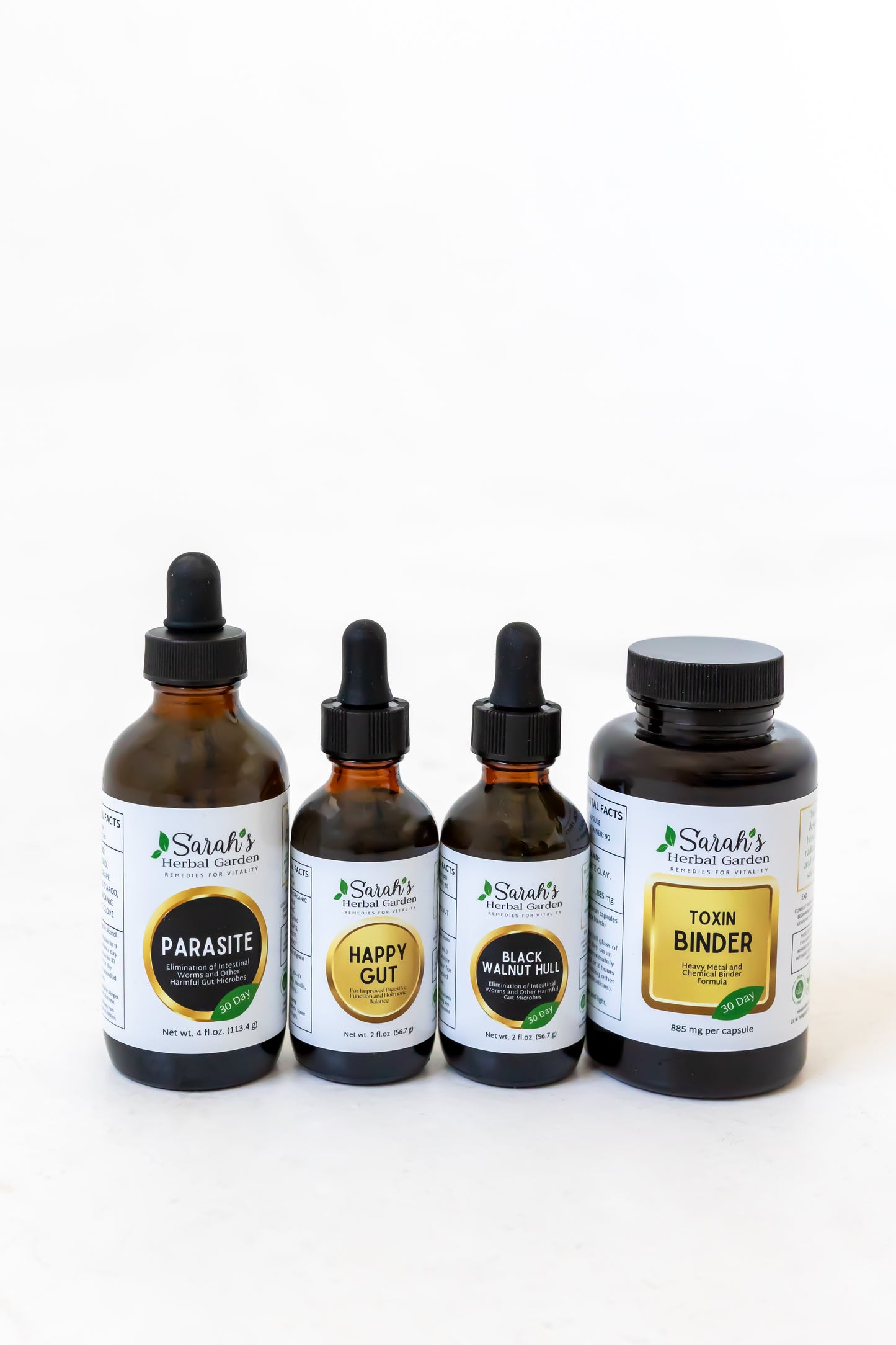
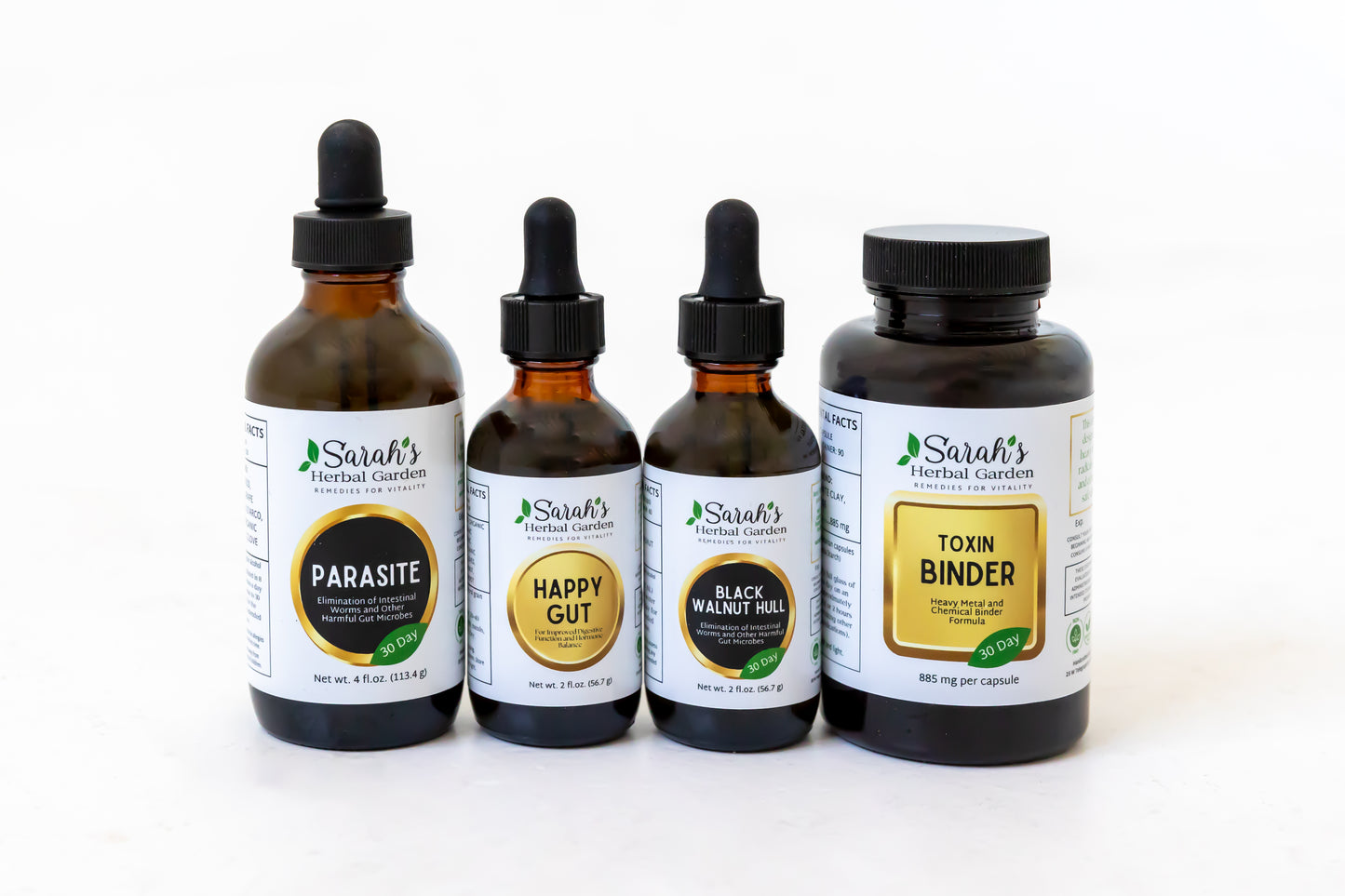
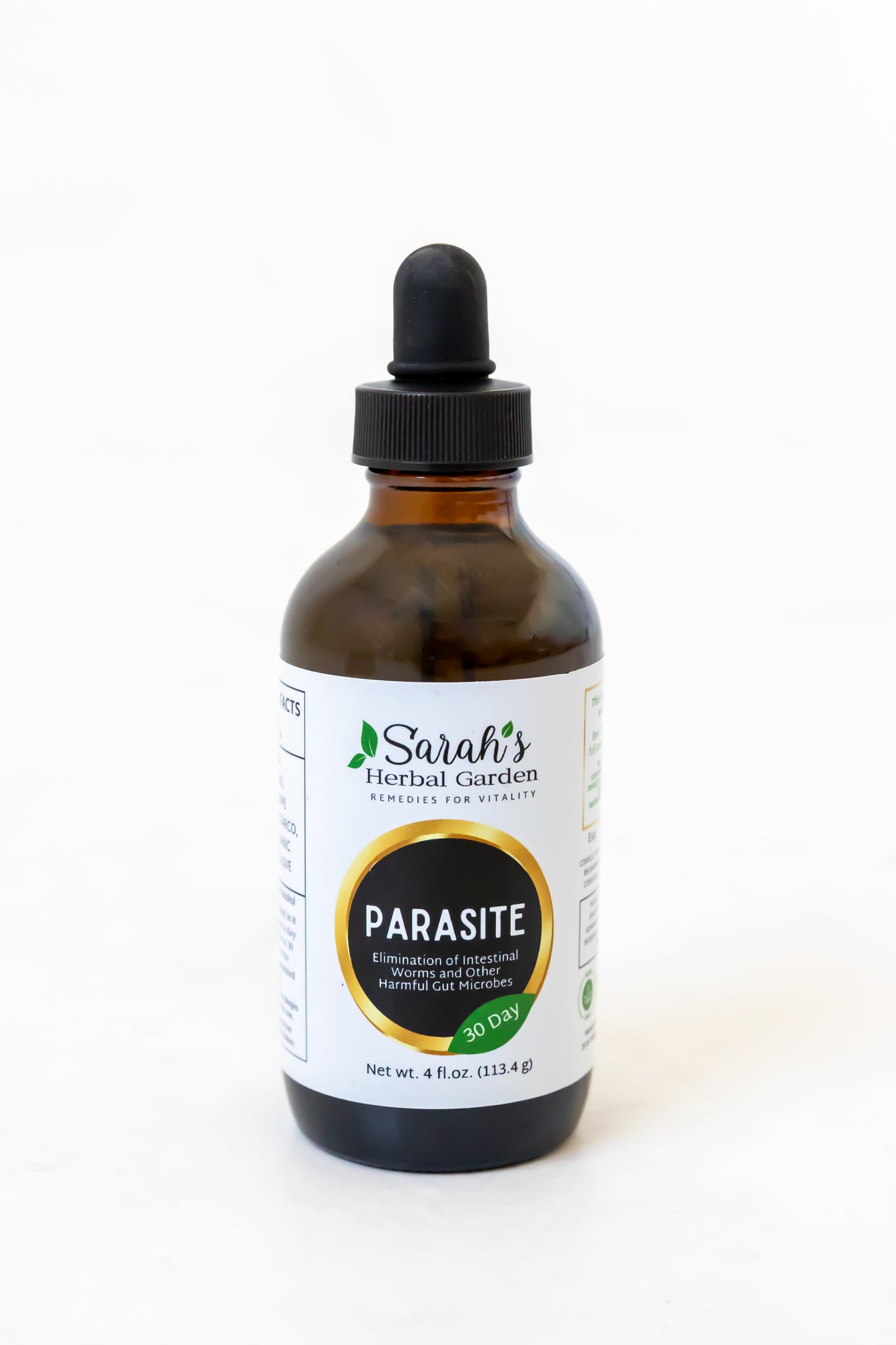
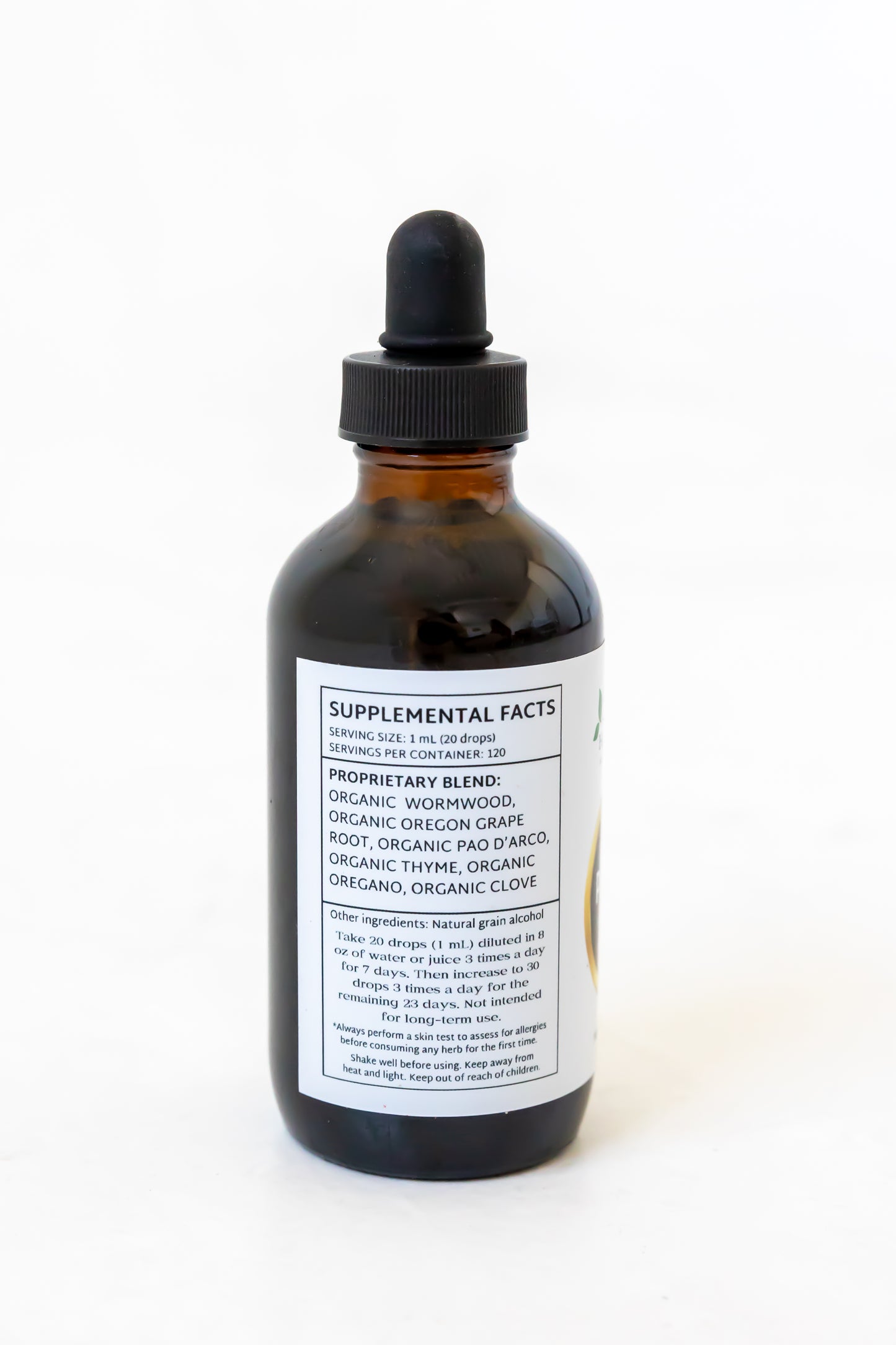
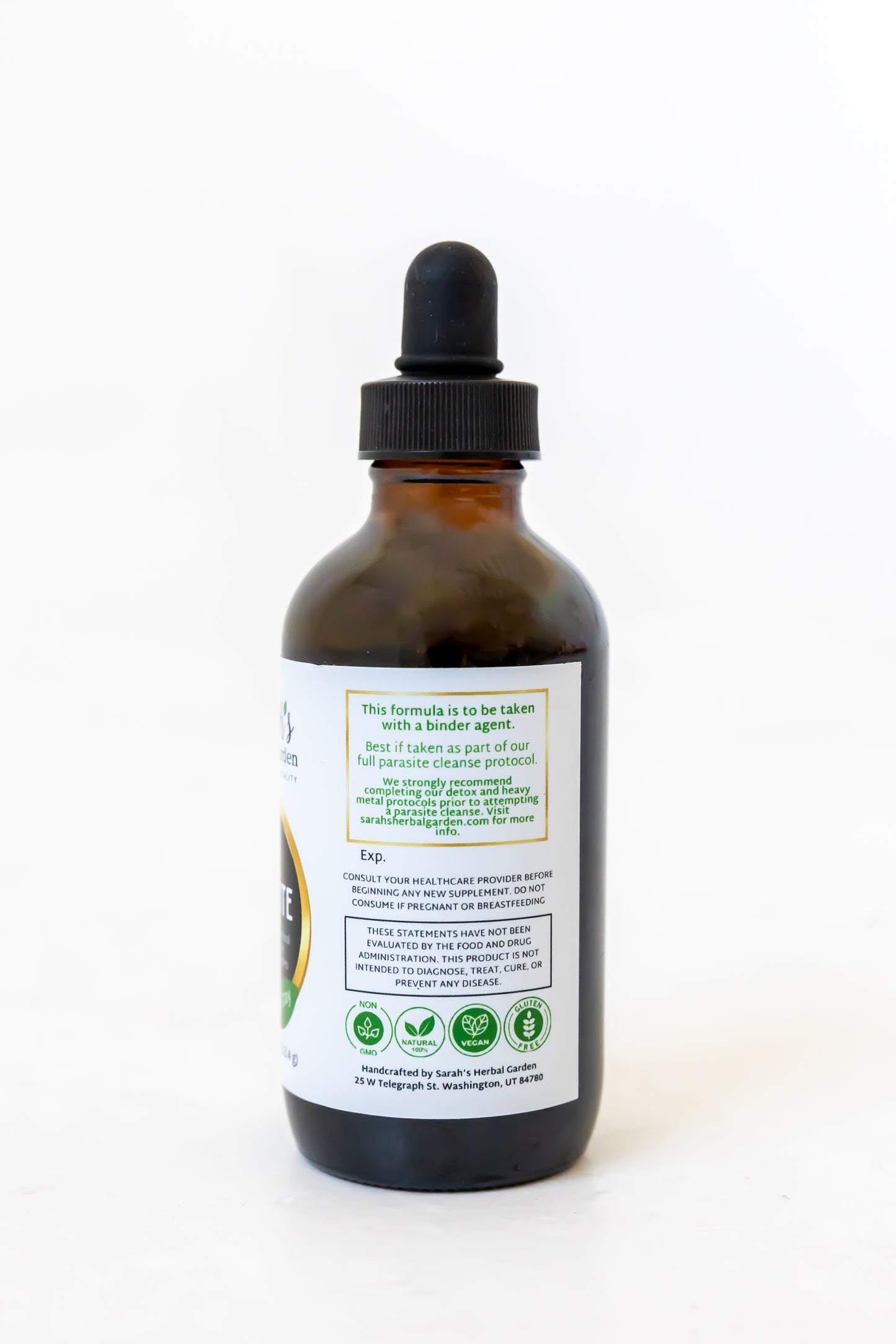
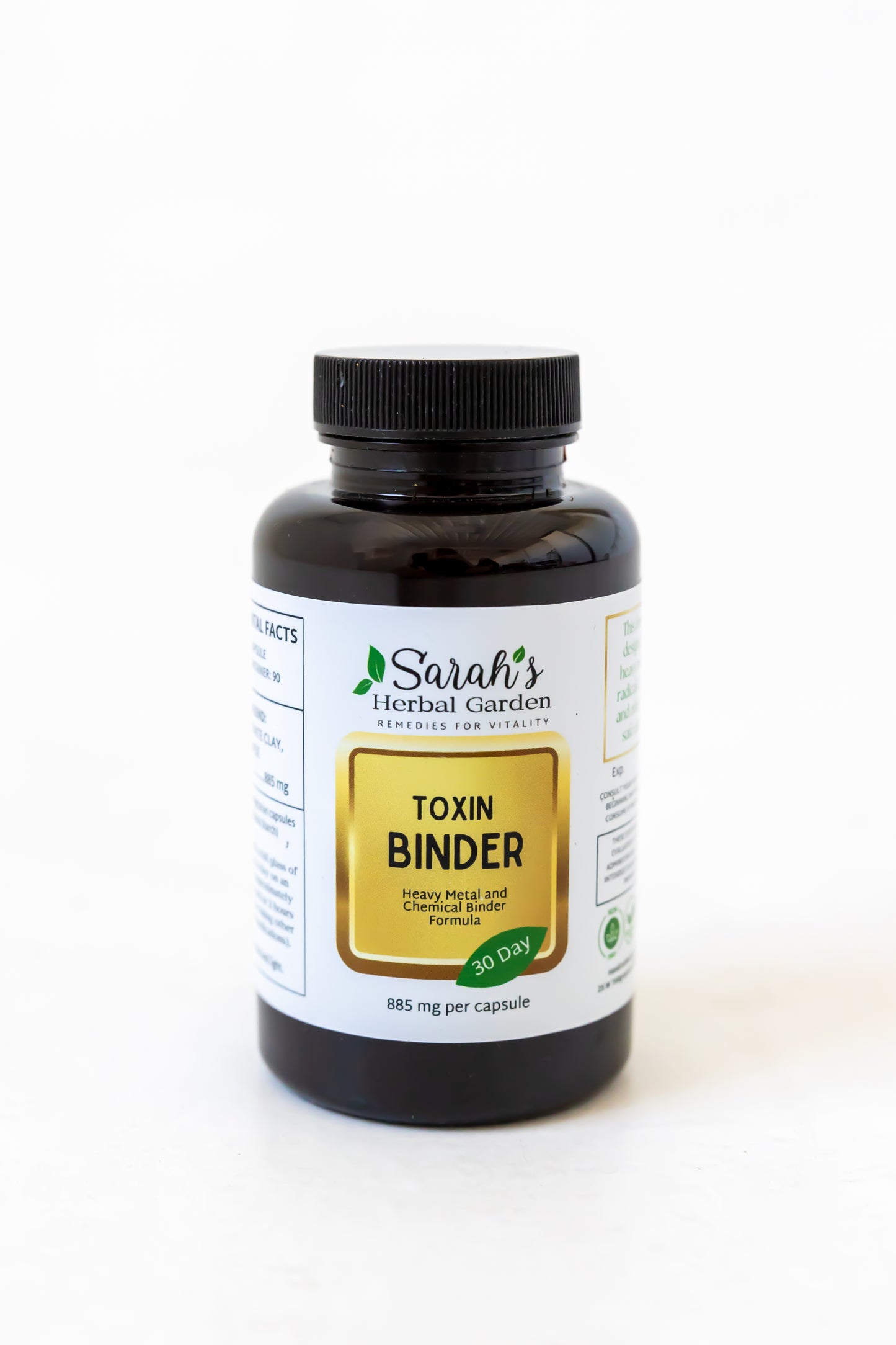
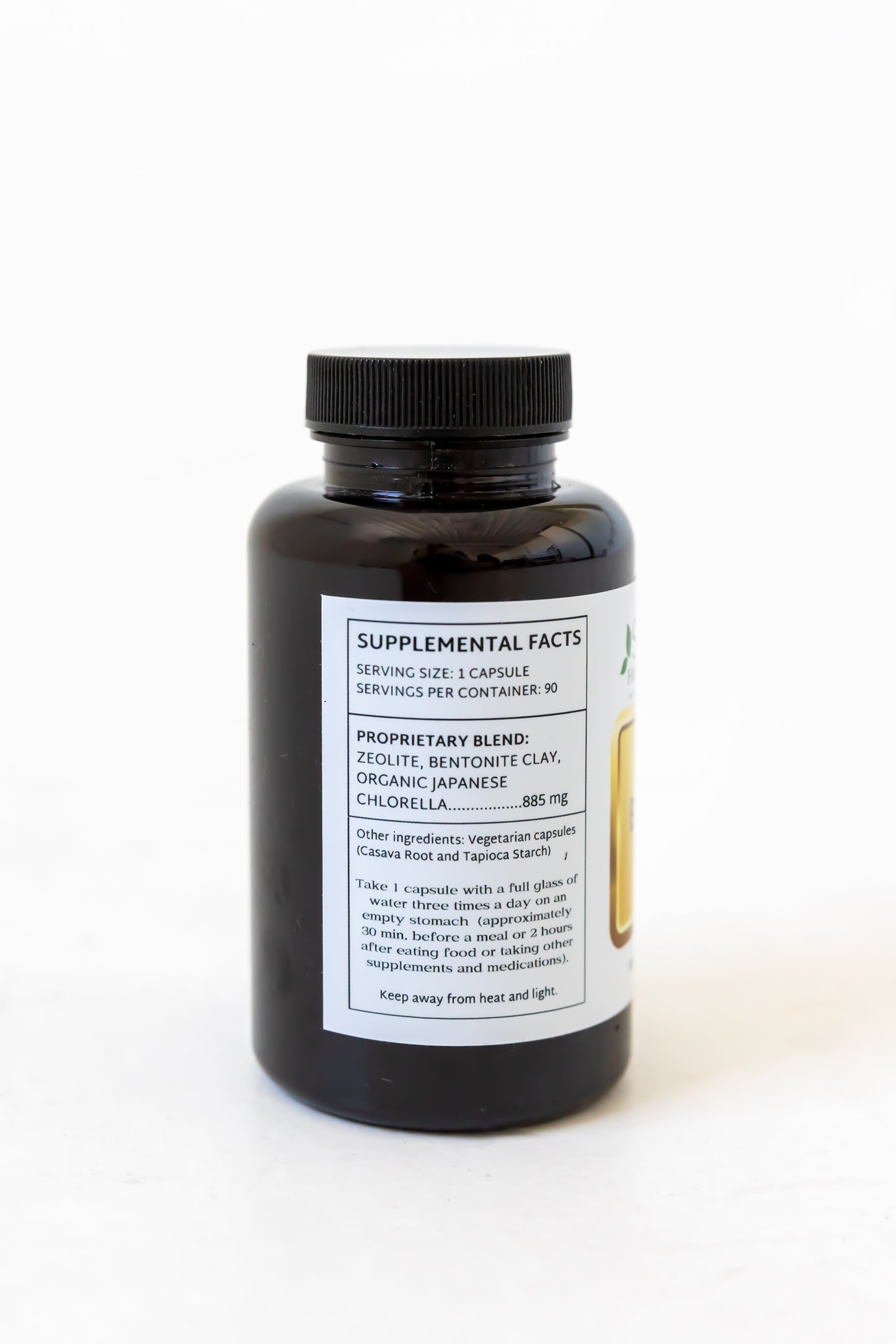
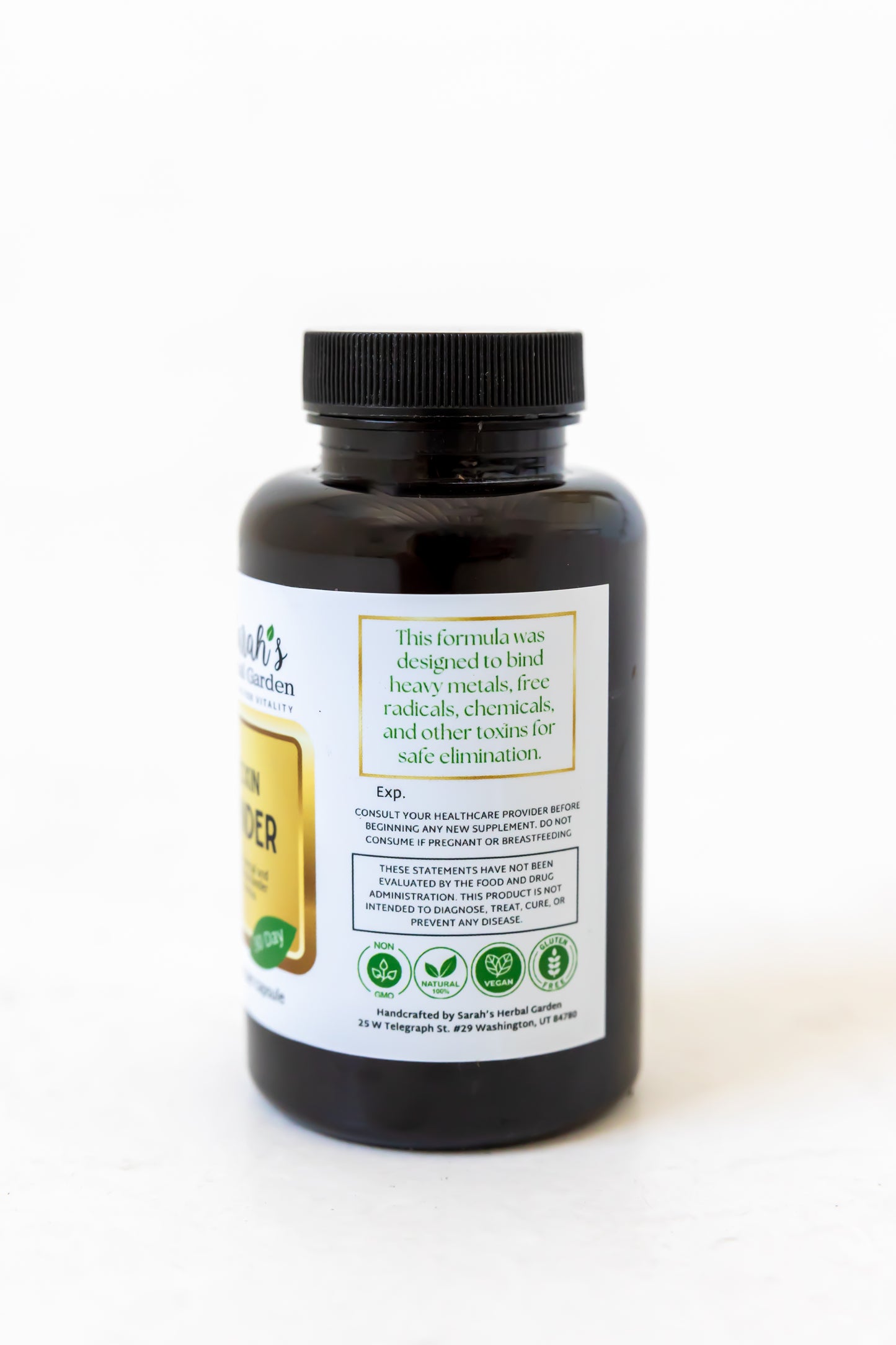
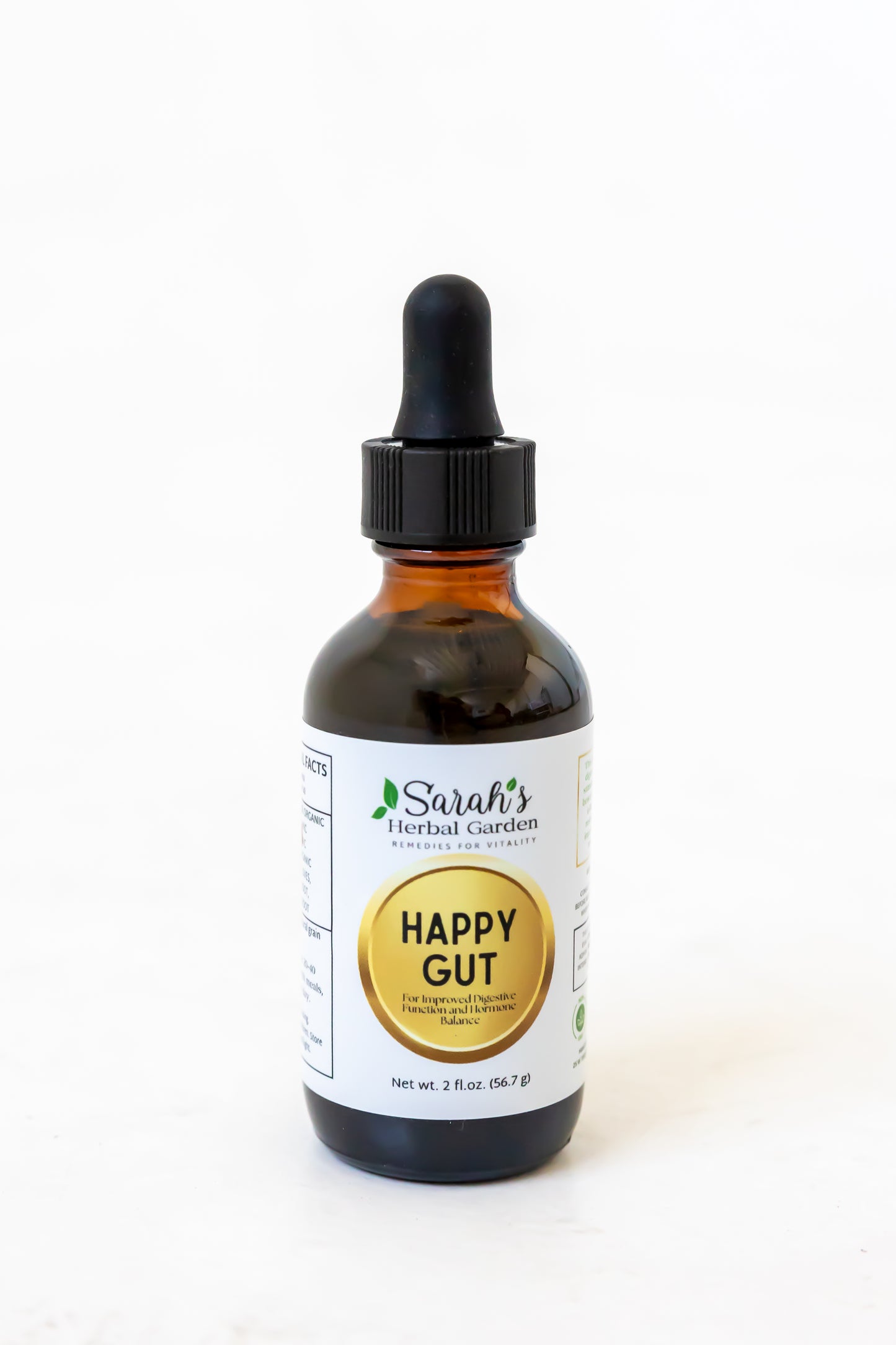
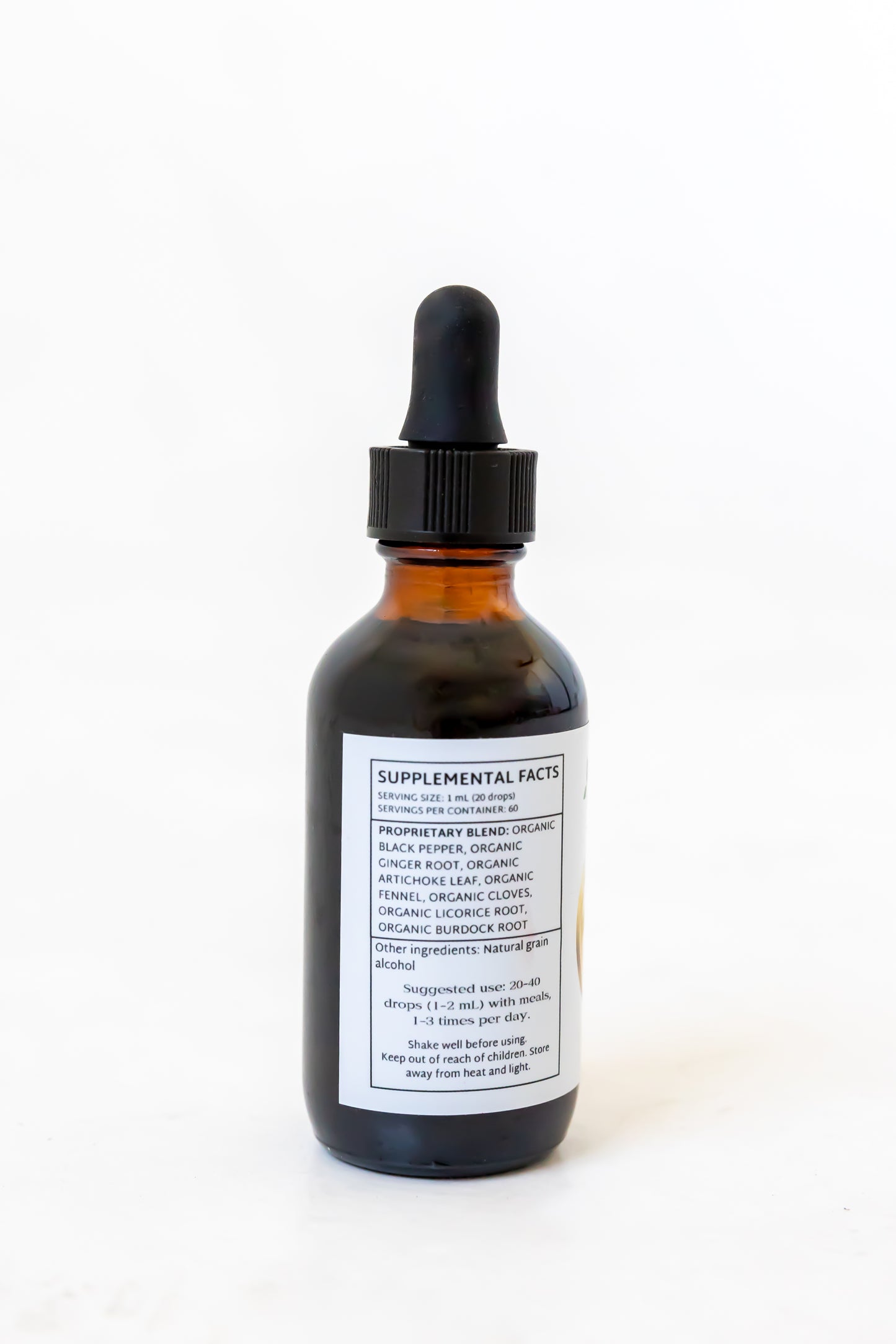
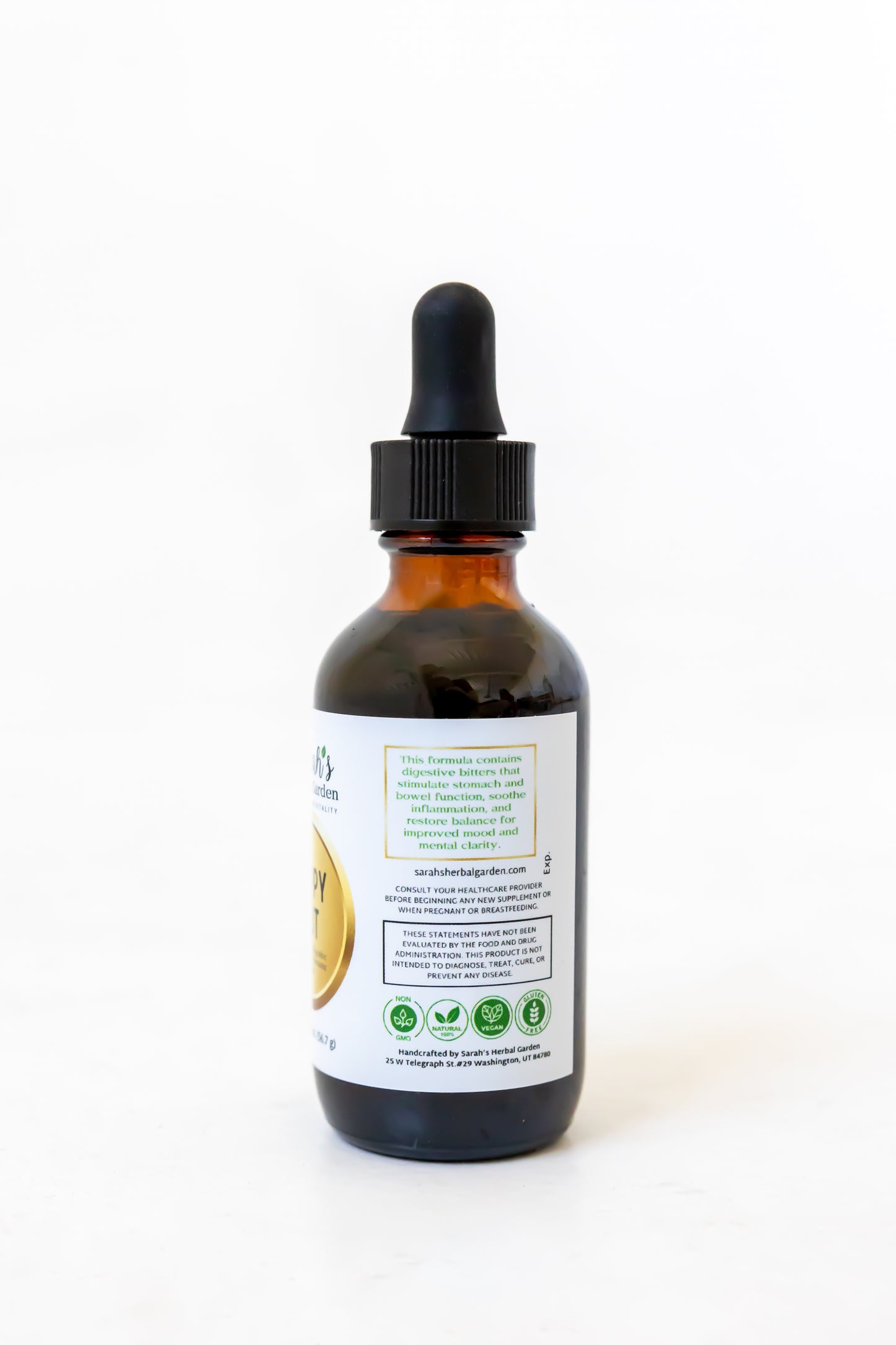
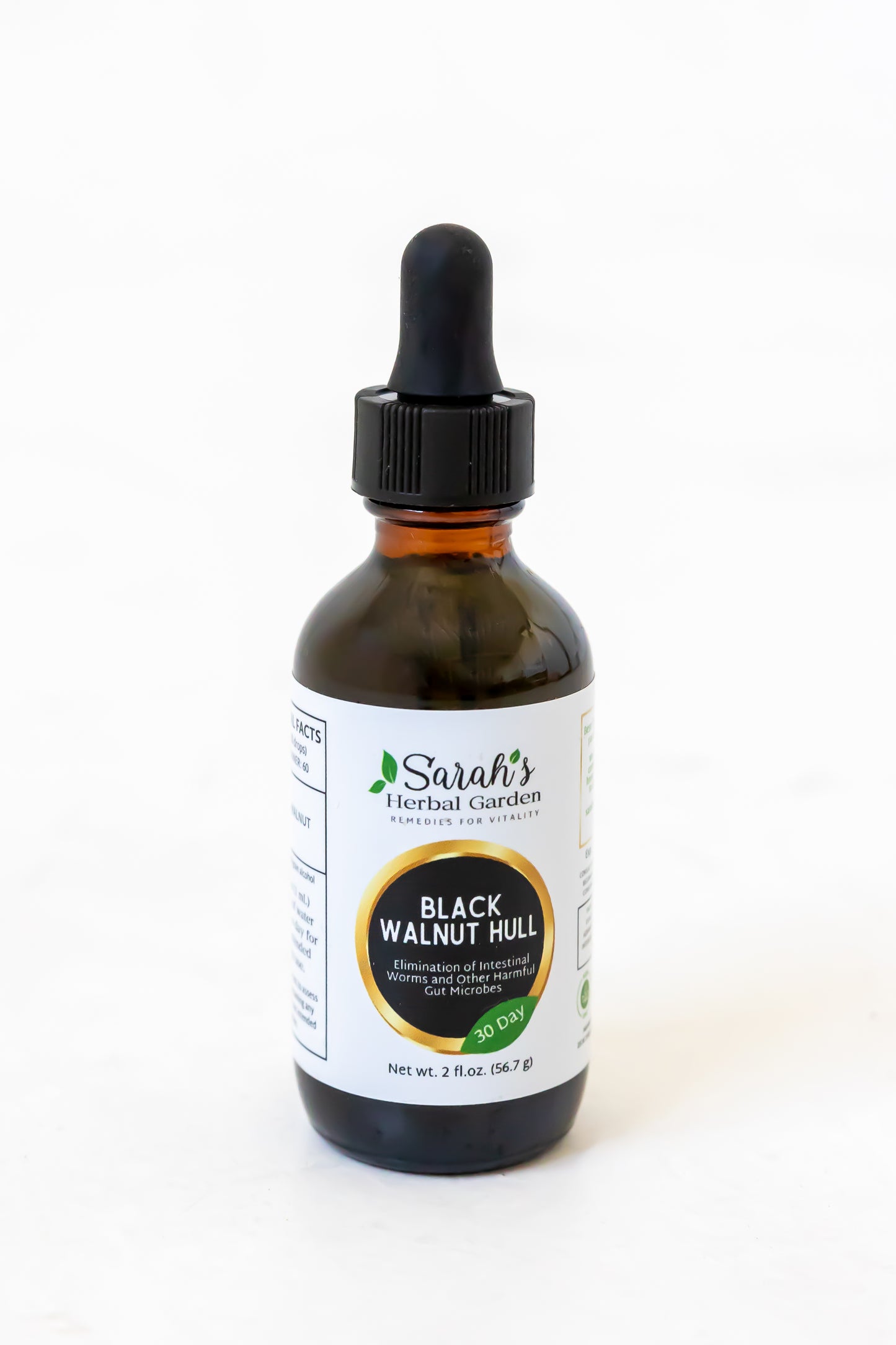
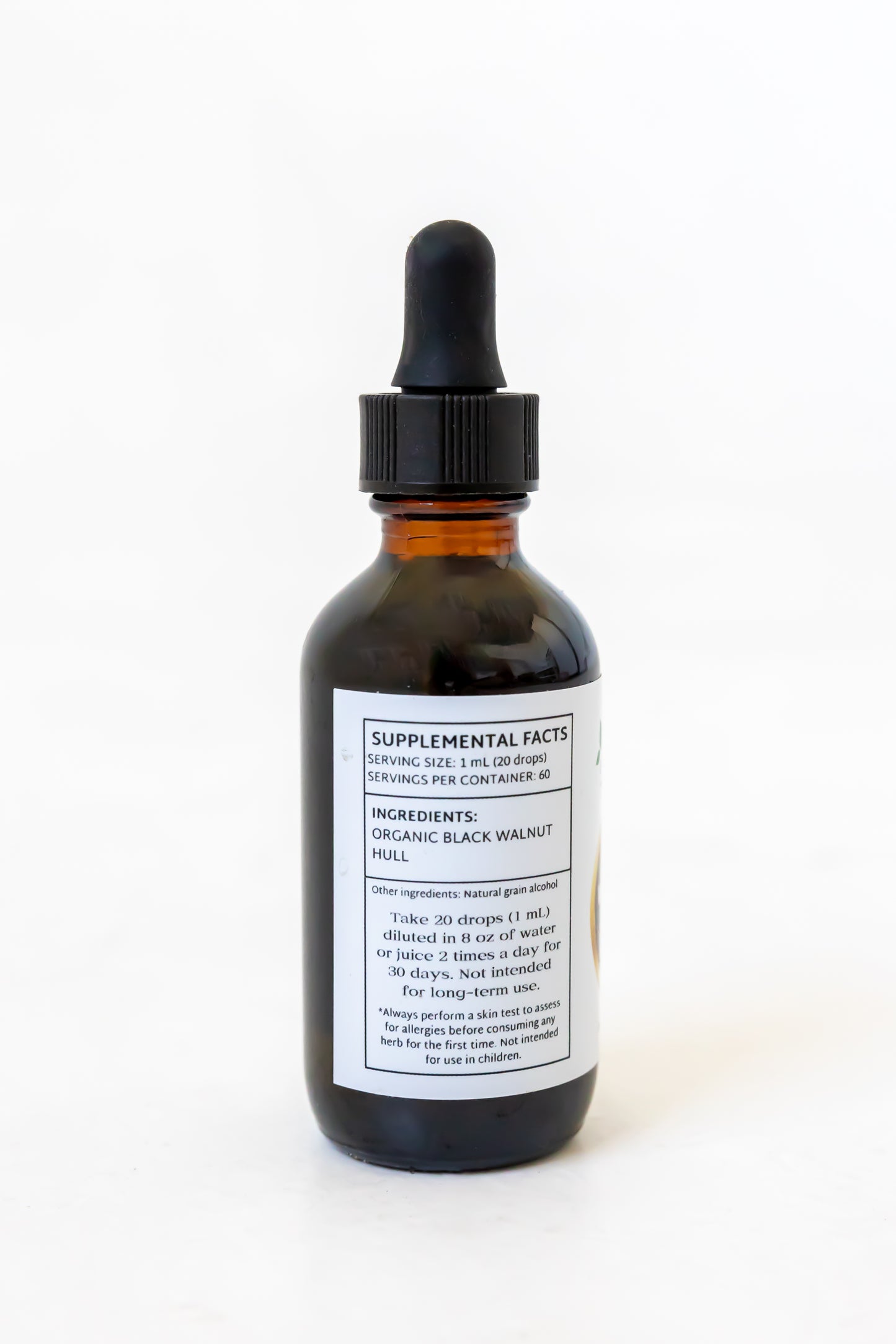
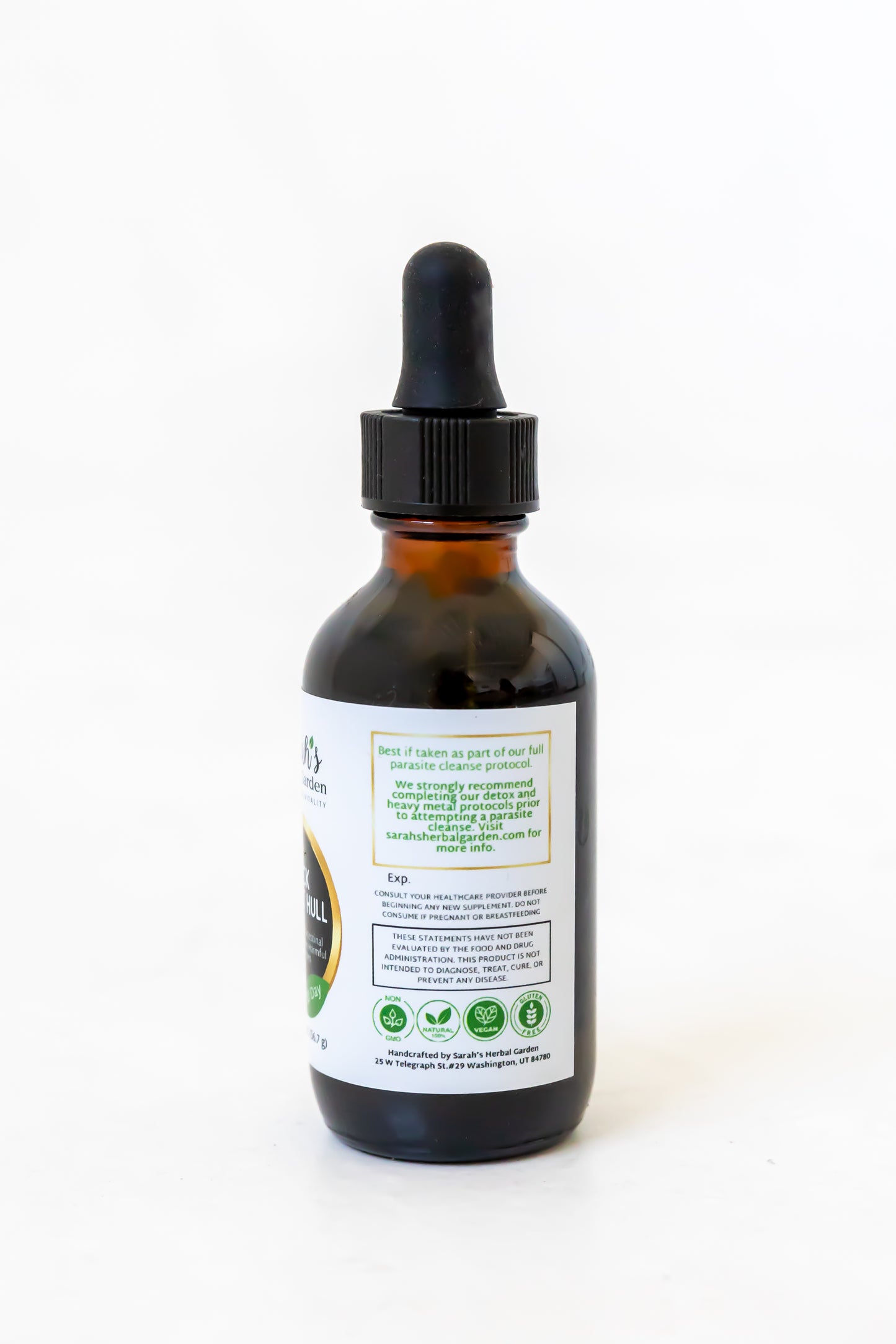
Herbs used in Parasite Formula
Clove
Clove (Syzygium aromaticum) is a powerful herb commonly used in parasite cleanses due to its strong antiparasitic, antimicrobial, antifungal, and anti-inflammatory properties. The key active compound in clove, eugenol, is responsible for much of its medicinal value. Here’s how clove helps with a parasite cleanse:
1. Kills Parasite Eggs
- Targeting Eggs: One of clove’s most important functions in a parasite cleanse is its ability to kill parasite eggs. Most antiparasitic treatments focus on killing adult parasites, but clove specifically targets the eggs, breaking the life cycle of parasites. This helps prevent reinfection, as the eggs are often a source of recurring parasitic problems.
- Eugenol: The compound eugenol in clove is toxic to parasite eggs, effectively disrupting their development and preventing them from hatching.
2. Antiparasitic Properties
- Kills Adult Parasites: Clove also has the ability to kill adult parasites, particularly intestinal worms such as roundworms, tapeworms, and pinworms. Eugenol, along with other compounds like caryophyllene and tannins, weakens the parasites' structure, leading to their death.
- Broad-Spectrum Activity: Clove’s antiparasitic effects extend to a variety of parasites, making it a versatile herb for cleansing the body of different types of parasites.
3. Antimicrobial and Antifungal Properties
- Kills Harmful Microorganisms: Clove’s broad-spectrum antimicrobial properties help eliminate not only parasites but also bacteria, fungi, and other pathogens that may coexist with parasitic infections. This is important because parasites often create an environment conducive to bacterial or fungal overgrowth.
- Fights Candida: Clove is effective against Candida overgrowth, a common issue in the gut that often accompanies parasitic infections. Its antifungal properties help restore balance to the gut microbiome.
4. Anti-inflammatory Effects
- Reduces Gut Inflammation: Parasitic infections often cause inflammation in the digestive system, leading to symptoms like bloating, cramping, and pain. Clove’s anti-inflammatory properties, primarily due to eugenol, help soothe the gut lining and reduce this inflammation.
- Promotes Healing: By reducing inflammation, clove supports the healing of the intestinal lining, which may be damaged by parasites or their toxins. This is especially beneficial in conditions like leaky gut syndrome, where the gut lining becomes more permeable due to parasitic damage.
5. Supports Digestive Health
- Stimulates Digestion: Clove stimulates the production of digestive enzymes, which helps improve digestion and nutrient absorption. Parasitic infections often impair digestion, leading to nutrient deficiencies and gastrointestinal discomfort.
- Relieves Gas and Bloating: Clove’s carminative properties help reduce gas, bloating, and indigestion, which are common symptoms associated with parasitic infections. By promoting the expulsion of gas, clove helps relieve discomfort and supports smoother digestion.
6. Boosts Immune System
- Strengthens Immune Response: Clove has immune-boosting properties, helping the body fight off parasites more effectively. A strong immune system is essential for identifying and eliminating parasites and for preventing reinfection.
- Antioxidant Effects: Clove is rich in antioxidants, which help protect the body from oxidative stress caused by parasites and their toxins. These antioxidants support the body’s ability to recover from parasitic infections and reduce overall damage to tissues.
7. Detoxifying the Gut
- Promotes Bowel Movements: Clove helps stimulate the digestive system and promotes regular bowel movements. This is crucial during a parasite cleanse, as regular bowel movements help flush dead parasites, their eggs, and toxins out of the body.
- Cleanses the Intestines: By promoting the removal of waste and toxins, clove helps cleanse the intestines and restore a healthy gut environment, making it less hospitable to parasites.
8. Synergistic Effects with Other Antiparasitic Herbs
- Used with Wormwood and Black Walnut: Clove is often used in combination with other antiparasitic herbs like wormwood and black walnut hulls in parasite cleansing protocols. While black walnut and wormwood kill adult parasites, clove’s unique ability to target and destroy parasite eggs makes it an essential part of a comprehensive cleanse.
- Targets Multiple Life Stages: Together, these herbs ensure that parasites at all stages of their life cycle—eggs, larvae, and adults—are eliminated, providing a more thorough cleanse and reducing the risk of reinfection.
9. Supports Detoxification
- Liver and Kidney Support: Clove’s detoxifying properties help support the liver and kidneys, two organs responsible for processing and eliminating toxins from the body. During a parasite cleanse, these organs work harder to remove the waste products generated by the death of parasites, and clove helps ease this process.
- Prevents Toxin Buildup: Clove helps prevent the buildup of toxins released by parasites as they die, reducing symptoms like fatigue, headaches, and digestive upset that can occur during a cleanse.
Wormwood
Wormwood (Artemisia absinthium) is a potent herb traditionally used in herbal medicine to cleanse the body of parasites. It contains powerful compounds, such as thujone, sesquiterpene lactones, and isothujone, that contribute to its antiparasitic properties. Wormwood is often used in parasite cleansing protocols, particularly in combination with other antiparasitic herbs like black walnut and cloves. Here’s how wormwood helps with a parasite cleanse:
1. Kills Parasites
- Thujone and Sesquiterpene Lactones: The compounds thujone and sesquiterpene lactones found in wormwood are toxic to many types of intestinal parasites, including roundworms, pinworms, and tapeworms. These compounds work by weakening the parasites’ cell membranes and inhibiting their ability to reproduce.
- Paralyzes Parasites: Wormwood has a paralyzing effect on parasites, making them unable to hold onto the intestinal walls. This causes the parasites to detach from the intestines, making it easier for the body to expel them through bowel movements.
2. Disrupts Parasite Metabolism
- Interferes with Parasite Function: Wormwood’s sesquiterpene lactones are believed to interfere with the energy production and metabolism of parasites, making it difficult for them to survive in the host's body.
- Inhibits Reproduction: By disrupting the parasites' ability to metabolize nutrients and energy, wormwood can reduce the likelihood of parasites reproducing and multiplying in the intestines, helping to break their life cycle.
3. Stimulates Digestive Health
- Increases Bile Production: Wormwood stimulates the production of bile in the liver, which is essential for breaking down fats and aiding digestion. Bile also acts as a natural cleanser for the liver and intestines, helping to flush out parasites, toxins, and waste materials from the body.
- Improves Gut Motility: Wormwood enhances digestive function by promoting regular bowel movements and preventing constipation. Regular bowel movements are crucial during a parasite cleanse to ensure that the dead parasites are expelled from the body.
4. Reduces Inflammation in the Gut
- Anti-inflammatory Properties: Wormwood has natural anti-inflammatory properties that help soothe irritation and inflammation in the intestines caused by parasitic infections. This reduces symptoms such as bloating, cramping, and abdominal discomfort.
- Heals Gut Lining: By reducing inflammation, wormwood can support the healing of the intestinal lining, which is often damaged by parasites. This promotes long-term gut health and recovery from infection.
5. Supports Detoxification
- Flushes Out Parasites: Wormwood helps detoxify the body by increasing bile flow and promoting the elimination of toxins, dead parasites, and their eggs. This supports the body's natural detoxification processes, reducing the toxic load on the liver and intestines.
- Promotes Liver Health: By stimulating liver function, wormwood helps the body process and eliminate harmful substances, including parasites, through bile excretion.
6. Synergistic Effect with Other Antiparasitic Herbs
- Combines Well with Other Herbs: Wormwood is often combined with other antiparasitic herbs like black walnut hull and clove for a more comprehensive parasite cleanse. While wormwood targets adult parasites, black walnut kills them, and clove helps eliminate parasite eggs, preventing reinfection. This combination targets parasites at various stages of their life cycle, making the cleanse more effective.
7. Antimicrobial and Antifungal Properties
- Fights Co-Infections: In addition to being antiparasitic, wormwood has antimicrobial and antifungal properties. This helps address co-infections that may accompany parasitic infections, such as fungal overgrowth (Candida) or harmful bacteria in the gut.
8. Prevents Reinfection
- Breaking the Life Cycle: Wormwood’s ability to kill adult parasites and disrupt their reproductive cycle helps break the life cycle of parasites, reducing the risk of reinfection. By ensuring that both adult parasites and their eggs are expelled, wormwood helps prevent parasites from continuing to thrive in the body.
Oregon Grape Root
Oregon grape root (Mahonia aquifolium) is a medicinal herb traditionally used for its antimicrobial, anti-inflammatory, and detoxifying properties. While not as well-known as other herbs like wormwood or black walnut in parasite cleansing, Oregon grape root can play a supportive role in a parasite cleanse due to its active compounds and overall benefits to the digestive and immune systems. Here's how Oregon grape root helps with a parasite cleanse:
1. Contains Berberine: A Potent Antiparasitic Compound
- Berberine: The active compound in Oregon grape root is berberine, an alkaloid with broad-spectrum antimicrobial, antiparasitic, antifungal, and antibacterial properties. Berberine disrupts the metabolic and reproductive cycles of parasites, making it harder for them to thrive in the body.
- Effective Against Protozoa: Berberine has been shown to be effective against protozoan parasites like Giardia lamblia and Entamoeba histolytica, which can cause infections in the intestines.
2. Supports Digestive Health and Bile Production
- Stimulates Bile Flow: Oregon grape root stimulates bile production in the liver. Bile helps break down fats during digestion and acts as a natural detoxifier for the intestines. Bile also aids in the flushing out of waste products, including dead parasites and their toxins, through bowel movements.
- Improves Digestion: Enhanced bile flow and improved digestion make it harder for parasites to attach to the gut lining, supporting the body’s natural ability to expel parasites.
3. Broad-Spectrum Antimicrobial Activity
- Kills Parasites and Other Pathogens: Berberine in Oregon grape root has been shown to kill a variety of intestinal parasites and pathogens, including bacteria and fungi, that may coexist with parasitic infections. This helps cleanse the gut and prevent further infections.
- Targets Harmful Gut Microbes: The antimicrobial properties of Oregon grape root ensure that the gut environment becomes less hospitable to harmful organisms, making it harder for parasites to survive.
4. Anti-inflammatory Properties
- Reduces Gut Inflammation: Parasite infections often cause inflammation in the gastrointestinal tract. Oregon grape root's anti-inflammatory effects help soothe and heal the intestinal lining, reducing common symptoms like bloating, cramping, and discomfort that result from parasitic activity.
- Soothes Irritated Gut Lining: By reducing inflammation, Oregon grape root promotes healing of the gut lining, which may have been damaged by parasites or their toxins.
5. Supports Immune Function
- Boosts Immune Response: Oregon grape root contains compounds that enhance the immune system's ability to fight infections. A stronger immune response helps the body eliminate parasites more efficiently and reduces the likelihood of reinfection.
- Antioxidant Benefits: Oregon grape root also has antioxidant properties, which help protect the body from oxidative stress caused by parasites. This protection allows cells to recover and reduces overall damage to the intestines.
6. Detoxification Support
- Liver and Kidney Support: Oregon grape root aids in liver and kidney function, both essential organs for detoxifying the body. By improving liver function, it helps process and eliminate the toxins released by parasites as they die, reducing the body’s toxic load.
- Promotes Waste Elimination: The herb also helps promote bowel regularity, which is essential for expelling parasites and their waste products from the intestines.
7. Restores Gut Flora Balance
- Kills Harmful Organisms, Supports Beneficial Bacteria: Oregon grape root’s antimicrobial properties help eliminate harmful organisms in the gut that may accompany parasitic infections, while allowing beneficial gut flora to flourish. A healthy balance of gut bacteria is essential for overall digestive health and immune function.
- Prevents Dysbiosis: Dysbiosis, an imbalance of gut bacteria, often occurs with parasitic infections. Oregon grape root helps prevent and correct this imbalance by promoting healthy gut flora.
8. Antifungal Properties
- Effective Against Candida Overgrowth: Along with its antiparasitic properties, Oregon grape root is effective against fungal infections like Candida overgrowth, which may occur alongside parasitic infections. This makes it useful for addressing multiple infections simultaneously.
- Prevents Fungal Co-Infections: Its antifungal activity helps reduce the risk of fungal overgrowth, which can develop when the gut environment is disrupted by parasites.
9. Synergistic Effects with Other Antiparasitic Herbs
- Combination Therapy: Oregon grape root is often used alongside other antiparasitic herbs like wormwood, black walnut, and clove for a more comprehensive cleanse. Its role is primarily to support digestion, boost immunity, and target protozoan parasites, while other herbs may directly kill or paralyze larger parasites.
- Enhances Efficacy of Other Herbs: Its broad-spectrum antimicrobial action enhances the overall effectiveness of the parasite cleanse by ensuring that harmful organisms in the gut are removed.
Pao D'Arco
Pau d'Arco (Tabebuia impetiginosa), also known as Taheebo or Lapacho, is a tree native to South America that has been traditionally used for its medicinal properties. The inner bark of Pau d'Arco contains active compounds, particularly naphthoquinones such as lapachol and beta-lapachone, which give it powerful antimicrobial, antiparasitic, antifungal, and anti-inflammatory effects. Here’s how Pau d'Arco helps with a parasite cleanse:
1. Antiparasitic Properties
- Lapachol and Beta-Lapachone: These compounds in Pau d'Arco are known to have strong antiparasitic effects. They work by inhibiting the growth and reproduction of parasites in the intestines. This disrupts the parasite’s ability to survive and multiply.
- Effective Against Protozoa: Pau d'Arco is particularly effective against protozoan parasites like Giardia lambliaand Trichomonas vaginalis, which can cause gastrointestinal and urinary tract infections.
2. Broad-Spectrum Antimicrobial Activity
- Kills Harmful Microorganisms: Pau d'Arco has broad-spectrum antimicrobial activity, meaning it can target a wide range of harmful organisms, including bacteria, fungi, and viruses, in addition to parasites. This makes it useful in addressing not only parasites but also secondary infections that may accompany parasitic infestations.
- Fights Co-Infections: In many cases, parasitic infections are accompanied by bacterial or fungal overgrowth. Pau d'Arco’s antimicrobial properties help eliminate these co-infections, promoting overall gut health.
3. Anti-inflammatory Properties
- Reduces Gut Inflammation: Parasite infections often cause significant inflammation in the digestive tract, leading to symptoms like bloating, cramping, and discomfort. Pau d'Arco has anti-inflammatory effects that can help reduce inflammation and soothe the gastrointestinal lining.
- Heals Gut Lining: By reducing inflammation, Pau d'Arco promotes the healing of the intestinal lining, which can be damaged by parasites and their toxins. This is important for restoring gut health after a parasitic infection.
4. Supports Immune System Function
- Boosts Immune Response: Pau d'Arco helps stimulate the immune system, which is crucial for fighting off parasites. It increases the activity of white blood cells, helping the body recognize and eliminate parasites more effectively.
- Prevents Reinfection: A stronger immune system also helps prevent reinfection by making it more difficult for parasites to take hold again after they have been expelled.
5. Promotes Detoxification
- Supports Liver Function: Pau d'Arco supports liver function, which plays a critical role in detoxifying the body. The liver helps process and eliminate toxins released by dying parasites during a cleanse.
- Aids in Waste Elimination: Pau d'Arco promotes healthy bowel movements, which is essential for expelling dead parasites and their byproducts from the intestines.
6. Antifungal Properties
- Fights Candida Overgrowth: In addition to being antiparasitic, Pau d'Arco has strong antifungal properties that help fight yeast overgrowth, particularly Candida. Candida overgrowth often accompanies parasitic infections due to a weakened immune system and gut imbalance.
- Prevents Fungal Infections: Pau d'Arco’s ability to fight fungal infections makes it especially useful in individuals dealing with both parasites and yeast infections, ensuring that the gut is restored to a balanced state.
7. Supports Digestive Health
- Improves Gut Flora Balance: Pau d'Arco’s antimicrobial properties can help clear out harmful organisms in the gut, allowing beneficial bacteria to thrive. This promotes a healthier balance of gut flora, which is essential for digestion and immune function.
- Alleviates Digestive Symptoms: By reducing the load of harmful organisms and promoting a healthy gut environment, Pau d'Arco can help alleviate common symptoms associated with parasitic infections, such as bloating, gas, and irregular bowel movements.
8. Antioxidant Properties
- Protects Against Oxidative Stress: Parasites can generate free radicals that cause oxidative stress and damage to cells. The antioxidants in Pau d'Arco help neutralize these free radicals, reducing the damage caused by parasites and supporting the body’s ability to heal.
- Supports Tissue Repair: The antioxidant properties of Pau d'Arco help promote tissue repair, particularly in the intestines, which may be damaged by parasitic activity.
9. Combines Well with Other Antiparasitic Herbs
- Synergistic Effect: Pau d'Arco is often used in combination with other antiparasitic herbs like wormwood, black walnut, and cloves for a more comprehensive cleanse. While Pau d'Arco targets a wide range of pathogens, including parasites, bacteria, and fungi, other herbs may specifically target parasite eggs or larger parasites. The combination of these herbs enhances the overall effectiveness of a parasite cleanse.
Thyme
Thyme (Thymus vulgaris) is a potent herb with numerous medicinal properties that make it useful in supporting a parasite cleanse. It contains several active compounds, including thymol, carvacrol, and other essential oils, which have antimicrobial, antiparasitic, and anti-inflammatory effects. Here’s how thyme can assist with parasite cleansing:
1. Antiparasitic Properties
- Active Compounds: Thyme contains thymol and carvacrol, which have strong antiparasitic effects. These compounds can kill or inhibit the growth of a variety of parasites, particularly those that affect the digestive system.
- Mechanism: Thymol and carvacrol disrupt the cell membranes and metabolic processes of parasites, leading to their death. This mechanism makes thyme effective against intestinal parasites such as hookworms, roundworms, and pinworms.
2. Antimicrobial Activity
- Broad-Spectrum Antimicrobial: Thyme has broad-spectrum antimicrobial activity that helps fight not only parasites but also bacteria, fungi, and viruses that may accompany parasitic infections. This is particularly important because parasites often disrupt the balance of gut flora, leading to secondary infections.
- Fights Multiple Infections: Its antimicrobial properties can help eliminate harmful microorganisms in the gut, reducing the overall burden on the immune system and allowing the body to focus on eliminating parasites.
3. Antioxidant and Anti-inflammatory Effects
- Reduces Inflammation: Parasites can cause significant inflammation in the intestines, leading to symptoms such as bloating, cramping, and digestive discomfort. Thyme’s anti-inflammatory properties help reduce this inflammation, easing these symptoms and promoting gut healing.
- Antioxidant Protection: Thyme is rich in antioxidants, which help neutralize the free radicals generated by both parasites and the body’s immune response to them. This protects cells from oxidative damage and helps restore normal functioning.
4. Digestive Health Support
- Improves Digestion: Thyme has traditionally been used to support digestion, especially in cases of indigestion, gas, and bloating. Its carminative properties (ability to relieve gas) help improve digestive function, which can be compromised during a parasitic infection.
- Enhances Bowel Movements: By promoting healthy digestion and encouraging regular bowel movements, thyme helps the body expel parasites through the digestive tract.
5. Boosts Immune System
- Immune Stimulation: Thyme’s immune-boosting properties help the body fight off parasites more effectively. It activates immune cells that target and attack parasites, enhancing the body's natural defense mechanisms.
- Prevents Reinfection: By supporting the immune system, thyme helps prevent reinfection by parasites and promotes faster recovery from parasitic infections.
6. Helps Expel Parasites
- Laxative Properties: Thyme has mild laxative effects, which promote the expulsion of parasites and their eggs from the intestines. Regular bowel movements are essential during a parasite cleanse to ensure that parasites are removed from the body rather than being reabsorbed.
- Breaks Life Cycles: By helping to expel both adult parasites and their eggs, thyme contributes to breaking the life cycle of parasites, reducing the risk of reinfection.
7. Effective Against Respiratory Parasites
- Clears Respiratory Tract: Thyme is also known for its ability to treat respiratory infections and parasites that may affect the lungs. Its antimicrobial compounds help clear mucus and expel parasitic organisms that can lodge in the respiratory system.
8. Restores Gut Flora Balance
- Supports Gut Health: Thyme’s antimicrobial activity can help eliminate harmful bacteria, fungi, and other pathogens in the gut, which often proliferate during parasitic infections. By clearing out harmful organisms, thyme helps restore a healthy balance of gut flora, which is crucial for long-term gut health and preventing future infections.
Oregano
Oregano (Origanum vulgare) is a powerful herb with significant antiparasitic, antimicrobial, and antifungal properties, making it an excellent choice for supporting a parasite cleanse. The key active compounds in oregano, particularly carvacrol and thymol, are responsible for its potent therapeutic effects. Here’s how oregano helps with a parasite cleanse:
1. Antiparasitic Properties
- Carvacrol and Thymol: Oregano contains high levels of carvacrol and thymol, two compounds known for their antiparasitic action. These compounds work by damaging the cell membranes of parasites, leading to their death.
- Effective Against Multiple Parasites: Oregano is effective against a range of intestinal parasites, including Giardia, Cryptosporidium, roundworms, pinworms, and tapeworms. It interferes with their metabolism and ability to survive in the intestines.
2. Broad-Spectrum Antimicrobial Action
- Kills Harmful Organisms: Oregano has broad-spectrum antimicrobial properties, meaning it can kill not only parasites but also harmful bacteria, fungi, and viruses. This is especially important because parasitic infections are often accompanied by bacterial or fungal overgrowth, such as Candida.
- Prevents Secondary Infections: By eliminating harmful microorganisms that may coexist with parasites, oregano helps prevent secondary infections and restores balance to the gut microbiome.
3. Anti-inflammatory Effects
- Reduces Gut Inflammation: Parasitic infections often lead to inflammation in the digestive tract, causing symptoms like bloating, cramping, and discomfort. Oregano’s anti-inflammatory properties help soothe the gut and reduce inflammation, making it easier for the body to heal.
- Soothes Digestive Discomfort: Oregano oil helps calm the digestive system, easing symptoms of intestinal irritation and discomfort that often accompany parasitic infections.
4. Supports Digestive Health
- Stimulates Digestive Enzymes: Oregano can stimulate the production of digestive enzymes, which helps improve digestion and nutrient absorption. This is important because parasites often interfere with the body's ability to properly digest and absorb food, leading to malnutrition.
- Promotes Gut Motility: Oregano supports healthy gut motility, helping food and waste move through the intestines more efficiently. This aids in the expulsion of parasites, preventing them from sticking to the intestinal walls and thriving.
5. Boosts Immune System Function
- Immune-Boosting Properties: Oregano helps stimulate the immune system, enhancing the body’s natural defenses against parasites. A strong immune system is essential for clearing parasitic infections and preventing reinfection.
- Antioxidant Protection: Oregano is rich in antioxidants, which help protect the body from oxidative stress caused by parasites and their toxins. These antioxidants support immune function and reduce damage to the gut lining.
6. Expels Parasites and Toxins
- Promotes Bowel Movements: Oregano oil has a mild laxative effect, which can help promote regular bowel movements. This is crucial during a parasite cleanse, as it helps ensure that dead parasites and their toxins are efficiently expelled from the body.
- Breaks Parasite Life Cycle: By helping to expel both adult parasites and their eggs, oregano contributes to breaking the life cycle of parasites and reducing the risk of reinfection.
7. Effective Against Protozoan Parasites
- Targets Protozoa: Oregano is particularly effective against protozoan parasites like Giardia lamblia and Entamoeba histolytica, which can cause severe gastrointestinal symptoms such as diarrhea, abdominal pain, and bloating.
- Inhibits Parasite Reproduction: Oregano compounds inhibit the reproduction of protozoan parasites, reducing their ability to multiply and cause further infection.
8. Antifungal Properties
- Fights Candida Overgrowth: Oregano is also highly effective against yeast overgrowth, particularly Candida albicans, which often accompanies parasitic infections due to a weakened immune system and gut imbalance.
- Prevents Fungal Co-Infections: Its antifungal properties help prevent Candida or other fungal infections from thriving alongside parasites, ensuring that the gut environment becomes inhospitable to both yeast and parasites.
9. Synergistic Effects with Other Antiparasitic Herbs
- Combines Well with Other Herbs: Oregano is often used in combination with other antiparasitic herbs like wormwood, black walnut, and cloves for a more comprehensive parasite cleanse. Each herb targets different stages of the parasite life cycle, and oregano’s broad-spectrum antimicrobial action complements the effects of these other herbs.
- Enhances Overall Effectiveness: When used as part of a synergistic blend, oregano enhances the overall effectiveness of the parasite cleanse by ensuring that a wide range of pathogens are eliminated from the gut.
Black Walnut Hull
*Black Walnut Hull is separate from the Parasite Tincture and is not included in the Nut Allergy Parasite Cleanse Protocol.*
Black walnut hull (Juglans nigra) is a potent herb traditionally used in parasite cleanses due to its powerful antiparasitic, antifungal, and antimicrobial properties. The hull, or outer part of the black walnut, contains several active compounds, including juglone, tannins, and iodine, that are responsible for its effectiveness in eliminating parasites and promoting gut health. Here’s how black walnut hull helps with a parasite cleanse:
1. Kills Parasites
- Juglone: The primary active compound in black walnut hull is juglone, which has strong antiparasitic properties. Juglone works by disrupting the metabolic processes of parasites, making it difficult for them to survive and reproduce in the host’s body.
- Toxic to Parasites: Black walnut hull is particularly effective against intestinal parasites such as tapeworms, roundworms, pinworms, and hookworms. It weakens and kills adult parasites, making it easier for the body to expel them through bowel movements.
2. Antimicrobial and Antifungal Properties
- Broad-Spectrum Antimicrobial: Black walnut hull has broad-spectrum antimicrobial properties, meaning it can kill not only parasites but also bacteria and fungi that may accompany parasitic infections. This helps restore balance in the gut by eliminating harmful organisms that thrive alongside parasites.
- Antifungal Action: Black walnut hull is effective against fungal infections like Candida, which often coexist with parasitic infections. By addressing both parasites and fungi, black walnut hull helps restore a healthy gut environment.
3. Breaks Parasite Life Cycle
- Kills Adult Parasites and Eggs: Black walnut hull is effective in killing both adult parasites and their eggs. This is critical in breaking the parasite life cycle, as eggs that are not eliminated can hatch and lead to reinfection.
- Prevents Reinfection: By eliminating parasite eggs from the intestines, black walnut hull reduces the risk of reinfection, helping to ensure that the body fully eliminates parasites and does not experience recurring issues.
4. Cleanses the Intestines
- Natural Laxative Effect: Black walnut hull has mild laxative properties that help stimulate bowel movements. This ensures that dead parasites, their eggs, and toxins are flushed out of the body efficiently, reducing the risk of them being reabsorbed into the system.
- Promotes Detoxification: The cleansing action of black walnut hull aids in detoxifying the intestines, making the digestive tract less hospitable to parasites and other harmful organisms.
5. Rich in Tannins
- Astringent Properties: Black walnut hull is rich in tannins, which are astringent compounds that help tighten and tone tissues. In the intestines, tannins help to shrink and dry out parasites, which weakens them and makes them easier to eliminate.
- Reduces Inflammation: The astringent action of tannins also helps reduce inflammation in the gut lining, which is often caused by parasitic infections. This can alleviate symptoms like bloating, cramping, and intestinal discomfort.
6. Supports Liver Health
- Liver Detoxification: Black walnut hull supports the liver, which plays a key role in detoxifying the body from the toxins released by parasites. By promoting liver function, black walnut hull helps the body process and eliminate these toxins more efficiently.
- Stimulates Bile Production: Black walnut hull helps stimulate bile production, which is essential for digestion and detoxification. Bile helps break down fats and facilitates the removal of waste, including parasites and their byproducts.
7. Rich in Iodine
- Antimicrobial Iodine Content: Black walnut hull is a natural source of iodine, which has antimicrobial properties. Iodine helps kill harmful organisms, including parasites, bacteria, and fungi, supporting a thorough cleanse of the digestive system.
- Thyroid Support: Iodine is also essential for thyroid function, which regulates metabolism and overall health. A healthy thyroid supports the body’s natural ability to fight infections, including parasitic infections.
8. Supports Immune System
- Boosts Immune Function: Black walnut hull helps stimulate the immune system, enhancing the body’s natural defenses against parasites. A stronger immune response is crucial for identifying and eliminating parasites from the body.
- Anti-inflammatory Properties: The anti-inflammatory compounds in black walnut hull help reduce inflammation caused by parasitic infections, allowing the immune system to focus on clearing the infection.
9. Antioxidant Properties
- Neutralizes Free Radicals: Black walnut hull is rich in antioxidants, which help neutralize free radicals generated by parasitic infections and the body's immune response. These antioxidants protect cells from oxidative damage and support the healing of the intestinal lining.
- Promotes Gut Healing: The antioxidant and anti-inflammatory effects of black walnut hull help promote the healing of damaged tissues in the gut, reducing symptoms such as pain, bloating, and discomfort.
10. Works Synergistically with Other Antiparasitic Herbs
- Combination with Wormwood and Clove: Black walnut hull is often used in combination with other antiparasitic herbs like wormwood and clove. Together, these herbs form a powerful antiparasitic trio. While black walnut hull kills adult parasites, wormwood weakens them, and clove targets their eggs. This combination ensures that parasites at all stages of their life cycle are eliminated.
- Comprehensive Cleanse: Using black walnut hull with other herbs ensures a more comprehensive parasite cleanse, addressing multiple types of parasites and reducing the risk of reinfection.
Herbs Used in Happy Gut Formula
Black Pepper
Black pepper (Piper nigrum), often referred to as the "king of spices," has numerous benefits for gut health due to its active compound piperine and other bioactive compounds. Black pepper has been used traditionally to improve digestion, support nutrient absorption, and promote overall gut health. Here's how black pepper helps the gut:
1. Improves Digestion
- Stimulates Digestive Enzymes: Piperine in black pepper stimulates the secretion of digestive enzymes like amylase, lipase, and protease, which help break down carbohydrates, fats, and proteins. This makes digestion more efficient and helps prevent indigestion and discomfort.
- Increases Stomach Acid: Black pepper stimulates the production of hydrochloric acid (HCl) in the stomach, which is essential for digesting proteins and absorbing nutrients. Adequate levels of stomach acid prevent indigestion, bloating, and gas.
2. Enhances Nutrient Absorption
- Bioavailability Booster: One of the key benefits of black pepper is its ability to increase the bioavailability of other nutrients and compounds. Piperine inhibits certain enzymes in the digestive system that would otherwise break down nutrients before they are absorbed. This means black pepper can enhance the absorption of vitamins, minerals, and medicinal compounds from other foods and supplements, including curcumin from turmeric, selenium, vitamin B12, and beta-carotene.
- Improves Nutrient Uptake: Piperine increases the absorption and bioavailability of nutrients like iron and calcium, making it easier for the body to obtain essential nutrients from food.
3. Relieves Gas and Bloating
- Carminative Properties: Black pepper has carminative effects, meaning it helps prevent and relieve the formation of gas in the gastrointestinal tract. This can alleviate bloating, discomfort, and flatulence.
- Reduces Gas Formation: By improving digestion and stimulating digestive enzymes, black pepper helps reduce the buildup of gas that can lead to bloating and cramping.
4. Promotes Gut Motility
- Stimulates Peristalsis: Black pepper stimulates the movement of the intestines (peristalsis), which helps move food and waste through the digestive tract more efficiently. This can prevent constipation and promote regular bowel movements.
- Improves Bowel Health: By supporting gut motility, black pepper helps ensure smooth digestion and timely elimination of waste, which is essential for overall gut health.
5. Anti-inflammatory Properties
- Reduces Gut Inflammation: Piperine has anti-inflammatory effects, which can help soothe inflammation in the digestive tract. Chronic gut inflammation can contribute to conditions like irritable bowel syndrome (IBS), ulcerative colitis, and Crohn's disease. By reducing inflammation, black pepper may help alleviate symptoms associated with these conditions.
- Supports Healing of Gut Lining: By reducing inflammation, black pepper can aid in the healing of the intestinal lining, which may be damaged by chronic inflammatory conditions, infections, or poor diet.
6. Antimicrobial Properties
- Fights Harmful Bacteria: Black pepper has natural antimicrobial properties that can help combat harmful bacteria in the gut, such as Escherichia coli (E. coli) and Salmonella. This helps maintain a healthy balance of gut microbiota and prevents infections that could disrupt digestive health.
- Prevents Dysbiosis: By controlling the growth of harmful bacteria and pathogens, black pepper helps prevent dysbiosis, an imbalance of gut bacteria that can lead to digestive issues like diarrhea, bloating, and inflammation.
7. Promotes Weight Management
- Boosts Metabolism: Piperine has thermogenic properties, meaning it can increase the body's metabolism and energy expenditure. This helps with the breakdown of fat and promotes weight loss, which can benefit gut health by reducing excess fat that may strain the digestive system.
- Supports Fat Digestion: Black pepper helps the body digest fats more effectively, which can reduce symptoms of indigestion and bloating, especially after consuming fatty meals.
8. Antioxidant Effects
- Protects Gut Cells: Black pepper is rich in antioxidants, which help neutralize free radicals and reduce oxidative stress in the digestive system. This protects the gut lining and other digestive tissues from damage, promoting long-term gut health.
- Supports Cellular Repair: The antioxidant properties of black pepper support the repair and regeneration of cells in the digestive tract, helping heal any damage caused by inflammation, infections, or stress.
9. Enhances Appetite and Digestive Comfort
- Stimulates Appetite: Black pepper has traditionally been used as an appetite stimulant. By enhancing the production of digestive enzymes and improving nutrient absorption, it can help restore appetite, particularly in individuals who have lost their appetite due to illness or digestive issues.
- Eases Digestive Discomfort: By improving overall digestion, black pepper helps ease digestive discomfort, reducing symptoms like stomach pain, indigestion, and nausea.
10. Prevents Acid Reflux
- Balancing Stomach Acid Levels: While black pepper increases the production of hydrochloric acid, it can also help balance stomach acid levels, preventing issues like acid reflux and heartburn. Proper acid levels aid in breaking down food efficiently and reducing backflow of acid into the esophagus.
- Prevents Indigestion: By promoting efficient digestion and reducing the likelihood of undigested food in the stomach, black pepper helps prevent the buildup of stomach acid that can cause reflux and indigestion.
11. Helps Heal the Gut Microbiome
- Supports Beneficial Bacteria: Piperine helps maintain a healthy gut microbiome by promoting the growth of beneficial gut bacteria. A balanced microbiome is essential for proper digestion, immune function, and overall gut health.
- Improves Gut Health Post-Antibiotics: Black pepper may be especially helpful after antibiotic treatments, which can disrupt the gut microbiome. Its antimicrobial properties help eliminate harmful bacteria, while its support for beneficial bacteria helps restore balance.
Ginger Root
Ginger root (Zingiber officinale) is widely known for its numerous health benefits, particularly for its positive effects on the digestive system and gut health. The active compounds in ginger, such as gingerols, shogaols, and zingerone, contribute to its anti-inflammatory, antioxidant, and digestive-enhancing properties. Here’s how ginger root helps with gut health:
1. Promotes Healthy Digestion
- Stimulates Digestive Enzymes: Ginger enhances the production of digestive enzymes like lipase and amylase, which help break down fats and carbohydrates more effectively. This supports overall digestion and helps prevent indigestion and discomfort after meals.
- Improves Gastric Motility: Ginger promotes peristalsis (the movement of muscles in the digestive tract), helping food move more smoothly through the stomach and intestines. This can help prevent indigestion, bloating, and the feeling of fullness after eating.
2. Relieves Nausea and Vomiting
- Anti-Nausea Effect: Ginger is well-known for its anti-nausea properties, making it effective for reducing nausea related to various conditions, including motion sickness, morning sickness, and postoperative nausea. It works by stimulating digestion and calming the stomach lining.
- Reduces Vomiting: By calming the digestive system, ginger can help reduce the urge to vomit, making it particularly useful for those experiencing nausea due to digestive issues or pregnancy.
3. Reduces Gas and Bloating
- Carminative Properties: Ginger has carminative properties, meaning it helps reduce gas buildup in the gastrointestinal tract. It aids in the expulsion of gas, which can relieve bloating and prevent discomfort.
- Eases Flatulence: By reducing the formation of gas and improving the digestive process, ginger helps ease symptoms of flatulence, making digestion more comfortable.
4. Anti-Inflammatory Effects
- Reduces Gut Inflammation: The active compounds in ginger, especially gingerols and shogaols, have potent anti-inflammatory properties. These compounds help reduce inflammation in the digestive tract, which is beneficial for conditions like irritable bowel syndrome (IBS), inflammatory bowel disease (IBD), and gastritis.
- Soothes Irritated Gut Lining: By reducing inflammation, ginger helps soothe the gut lining, which may become irritated by chronic conditions or infections. This promotes overall gut health and reduces symptoms like cramping and pain.
5. Alleviates Stomach Cramps and Spasms
- Antispasmodic Properties: Ginger helps relax the smooth muscles of the gastrointestinal tract, relieving stomach cramps and spasms. This is particularly beneficial for individuals with digestive disorders like IBS, where muscle spasms in the intestines cause discomfort.
- Reduces Abdominal Pain: By relaxing the intestinal muscles and reducing spasms, ginger can help alleviate abdominal pain associated with digestive issues.
6. Promotes Gut Motility and Regular Bowel Movements
- Improves Gut Motility: Ginger enhances the movement of food and waste through the intestines by stimulating muscle contractions. This can help prevent sluggish digestion, constipation, and promote regular bowel movements.
- Prevents Constipation: By encouraging regular gut motility, ginger helps prevent constipation, ensuring that waste is efficiently expelled from the body.
7. Protects Against Stomach Ulcers
- Reduces Stomach Acid: Ginger may help regulate the production of stomach acid, which can reduce the risk of developing ulcers. It helps balance acid levels, preventing irritation and damage to the stomach lining.
- Promotes Ulcer Healing: Ginger’s anti-inflammatory and antioxidant properties support the healing of ulcers by reducing inflammation and promoting tissue repair.
8. Helps Manage Acid Reflux (GERD)
- Reduces Heartburn: Ginger helps reduce excess stomach acid, which can lead to heartburn and acid reflux. By improving digestion and gastric motility, ginger reduces the risk of acid reflux by ensuring that food moves more quickly through the stomach.
- Soothes the Esophagus: Ginger’s ability to reduce acid production and promote smooth digestion helps protect the esophagus from acid reflux damage, making it beneficial for individuals with gastroesophageal reflux disease (GERD).
9. Supports Gut Microbiome Health
- Antimicrobial Properties: Ginger has antimicrobial effects that can help reduce harmful bacteria in the gut. This is beneficial for maintaining a healthy balance of gut flora, which is essential for optimal digestion and immune function.
- Promotes Beneficial Bacteria: By reducing harmful bacteria, ginger supports the growth of beneficial gut bacteria, which play a key role in maintaining gut health and overall well-being.
10. Antioxidant Protection
- Neutralizes Free Radicals: Ginger is rich in antioxidants, which help neutralize free radicals and reduce oxidative stress in the digestive system. This protects the gut lining and digestive tissues from damage caused by oxidative stress and inflammation.
- Promotes Healing: The antioxidant effects of ginger can also promote the repair and healing of damaged tissues in the digestive tract, helping to restore gut health after chronic inflammation or infection.
11. Prevents and Treats Infections
- Fights Gut Infections: Ginger’s antimicrobial properties make it effective in fighting infections in the digestive system caused by harmful bacteria or viruses. This can help reduce the severity of digestive disorders caused by infections, such as gastroenteritis.
- Prevents Gut Dysbiosis: Ginger’s ability to fight harmful bacteria helps prevent dysbiosis (an imbalance of gut bacteria), which can lead to digestive issues like bloating, diarrhea, and constipation.
12. Alleviates Symptoms of Irritable Bowel Syndrome (IBS)
- Reduces IBS Symptoms: Ginger is particularly beneficial for individuals with IBS. Its anti-inflammatory, antispasmodic, and carminative properties help reduce common IBS symptoms like bloating, gas, diarrhea, constipation, and abdominal pain.
- Calms Digestive Discomfort: By promoting smooth digestion and reducing inflammation, ginger helps ease the discomfort associated with IBS and other functional gastrointestinal disorders.
Artichoke Leaf
Artichoke leaf (Cynara scolymus) is known for its powerful digestive benefits and has been traditionally used to support gut health. The leaf extract contains active compounds like cynarin, chlorogenic acid, and luteolin, which contribute to its positive effects on digestion, liver function, and overall gastrointestinal well-being. Here’s how artichoke leaf helps with gut health:
1. Stimulates Bile Production
- Cynarin: Artichoke leaf contains cynarin, which stimulates the liver to produce bile. Bile is essential for digesting fats and breaking them down in the small intestine. Adequate bile flow helps the body absorb fat-soluble vitamins (A, D, E, and K) and prevents digestive issues related to poor fat digestion.
- Improves Fat Digestion: By increasing bile production, artichoke leaf enhances the digestion and absorption of fats, helping to reduce bloating, indigestion, and discomfort, especially after eating fatty meals.
2. Relieves Indigestion (Dyspepsia)
- Reduces Digestive Discomfort: Artichoke leaf extract is often used to relieve symptoms of dyspepsia, which includes bloating, nausea, gas, and stomach pain. Its ability to promote bile flow and improve digestion helps reduce the likelihood of indigestion.
- Improves Gastric Motility: Artichoke leaf helps improve gut motility, the process by which food moves through the digestive system. Better gastric motility can reduce the feeling of fullness and discomfort after eating.
3. Supports Liver Function and Detoxification
- Liver Protection: Artichoke leaf has hepatoprotective properties, meaning it helps protect liver cells from damage. The liver plays a crucial role in digestion by producing bile and detoxifying harmful substances. By supporting liver health, artichoke leaf enhances its ability to perform these vital functions.
- Aids in Detoxification: By promoting healthy liver function, artichoke leaf assists in the detoxification of the body, which includes filtering out toxins, waste products, and harmful substances from the digestive system.
4. Reduces Symptoms of Irritable Bowel Syndrome (IBS)
- Alleviates IBS Symptoms: Studies suggest that artichoke leaf extract can help reduce the severity of irritable bowel syndrome (IBS) symptoms, including abdominal pain, bloating, diarrhea, and constipation. Its ability to enhance bile flow, improve digestion, and reduce inflammation in the gut makes it beneficial for managing IBS.
- Improves Quality of Life: Regular use of artichoke leaf extract has been shown to improve the quality of life for individuals with IBS by reducing digestive discomfort and promoting regular bowel movements.
5. Prebiotic Effects
- Supports Gut Microbiome: Artichoke leaf contains inulin, a type of soluble fiber that acts as a prebiotic. Prebiotics feed beneficial gut bacteria, promoting a healthy balance of microbiota in the digestive system. A healthy gut microbiome is essential for proper digestion, immune function, and overall gut health.
- Prevents Dysbiosis: By nourishing beneficial bacteria, artichoke leaf helps prevent dysbiosis, an imbalance in gut flora that can lead to digestive issues such as bloating, diarrhea, and gas.
6. Reduces Inflammation in the Gut
- Anti-inflammatory Properties: Artichoke leaf contains chlorogenic acid and luteolin, which have strong anti-inflammatory effects. These compounds help reduce inflammation in the digestive tract, which is particularly beneficial for people with inflammatory bowel conditions such as Crohn’s disease and ulcerative colitis.
- Soothes the Gut Lining: By reducing inflammation, artichoke leaf helps soothe the gut lining, alleviating symptoms such as cramping, bloating, and discomfort.
7. Promotes Regular Bowel Movements
- Relieves Constipation: The bile-stimulating and digestive-enhancing properties of artichoke leaf can help relieve constipation by promoting regular bowel movements. It acts as a mild natural laxative by improving gut motility and ensuring that waste moves efficiently through the intestines.
- Prevents Constipation-Related Discomfort: Regular bile flow and proper digestion prevent the buildup of waste and toxins in the digestive tract, reducing the risk of constipation-related bloating and discomfort.
8. Helps Manage Acid Reflux and GERD
- Regulates Stomach Acid: Artichoke leaf can help reduce the production of excess stomach acid, which is beneficial for individuals suffering from acid reflux or gastroesophageal reflux disease (GERD). By promoting better digestion and reducing acidity, artichoke leaf can alleviate symptoms like heartburn and indigestion.
- Protects the Esophagus: The anti-inflammatory properties of artichoke leaf help protect the esophagus from irritation caused by acid reflux, reducing the severity of GERD symptoms.
9. Supports Weight Management
- Enhances Fat Metabolism: By promoting bile production and improving fat digestion, artichoke leaf can support healthy metabolism and help with weight management. Better fat digestion can lead to improved energy levels and reduced bloating after meals.
- Supports Healthy Cholesterol Levels: Artichoke leaf has been shown to help reduce LDL (bad) cholesterollevels and improve HDL (good) cholesterol, which is important for heart health and overall metabolism. Healthy cholesterol levels support better digestion and prevent issues related to poor fat metabolism.
10. Antioxidant Protection
- Rich in Antioxidants: Artichoke leaf is a good source of antioxidants like chlorogenic acid, which helps protect the gut lining from oxidative stress and free radical damage. This protection is important for maintaining healthy gut tissues and preventing damage caused by inflammation or toxins.
- Promotes Gut Healing: The antioxidant properties of artichoke leaf help promote the repair and regeneration of gut tissues, making it beneficial for individuals with gut inflammation or irritation.
Fennel
Fennel (Foeniculum vulgare) is a versatile herb with a long history of use in traditional medicine for improving digestion and promoting overall gut health. The seeds, bulbs, and leaves of the fennel plant contain active compounds like anethole, estragole, and fenchone, which contribute to its digestive benefits. Fennel helps relieve bloating, reduce inflammation, and support healthy digestion. Here’s how fennel benefits gut health:
1. Relieves Gas and Bloating
- Carminative Properties: Fennel is a natural carminative, which means it helps prevent the formation of gas in the intestines and aids in the expulsion of trapped gas. This makes fennel highly effective for reducing bloating and discomfort, especially after meals.
- Eases Flatulence: Fennel relaxes the muscles of the gastrointestinal tract, allowing gas to pass more easily, reducing bloating and relieving flatulence.
2. Improves Digestion
- Stimulates Digestive Enzymes: Fennel helps stimulate the production of digestive enzymes and gastric juices, which improves the breakdown of food and promotes better digestion. This helps prevent indigestion and discomfort after meals.
- Enhances Nutrient Absorption: By improving the efficiency of digestion, fennel allows for better absorption of nutrients from food, contributing to overall gut and metabolic health.
3. Reduces Inflammation in the Gut
- Anti-inflammatory Properties: Fennel contains compounds like anethole and flavonoids that have anti-inflammatory effects. This helps reduce inflammation in the gut lining, which is beneficial for individuals with conditions like irritable bowel syndrome (IBS) or inflammatory bowel disease (IBD).
- Soothes the Gut Lining: By calming inflammation, fennel helps soothe irritated gut tissues, reducing symptoms like cramping, bloating, and discomfort associated with digestive disorders.
4. Antispasmodic Effects
- Relaxes Intestinal Muscles: Fennel has antispasmodic properties, meaning it helps relax the smooth muscles of the intestines. This can relieve stomach cramps, spasms, and discomfort, particularly in conditions like IBS or colic.
- Eases Digestive Discomfort: By relaxing the digestive tract, fennel helps ease digestive discomfort and reduces the severity of abdominal pain and cramping.
5. Promotes Bowel Regularity
- Mild Laxative Effect: Fennel seeds contain fiber and essential oils that act as a mild laxative, promoting regular bowel movements. This helps prevent constipation and supports the healthy elimination of waste.
- Prevents Constipation: The fiber in fennel adds bulk to stool and stimulates gut motility, making it easier to pass stools and reducing the risk of constipation.
6. Alleviates Symptoms of IBS
- Reduces IBS Symptoms: Fennel is particularly effective for individuals with IBS. Its ability to relieve gas, bloating, and cramps helps reduce common IBS symptoms. The anti-inflammatory and antispasmodic effects of fennel make it beneficial for managing the discomfort associated with IBS.
- Improves Digestive Comfort: By reducing muscle spasms and soothing the digestive system, fennel improves overall digestive comfort in individuals with IBS, making it easier to manage flare-ups.
7. Prebiotic Support
- Promotes Healthy Gut Flora: Fennel seeds contain a small amount of fiber that can act as a prebiotic, supporting the growth of beneficial gut bacteria. A healthy gut microbiome is essential for proper digestion, immune function, and overall gut health.
- Prevents Dysbiosis: By promoting the growth of beneficial bacteria, fennel helps prevent dysbiosis, an imbalance of gut flora that can lead to digestive issues like bloating, diarrhea, and constipation.
8. Relieves Acid Reflux and Heartburn
- Balances Stomach Acid: Fennel can help reduce symptoms of acid reflux and heartburn by neutralizing excess stomach acid. It soothes the stomach lining, reduces irritation, and prevents acid from rising into the esophagus.
- Prevents GERD Symptoms: By promoting better digestion and reducing acid levels, fennel can help prevent symptoms of gastroesophageal reflux disease (GERD), such as heartburn and indigestion.
9. Reduces Nausea and Vomiting
- Calms the Stomach: Fennel has been used traditionally to calm the stomach and reduce nausea. It is particularly helpful for easing nausea after meals or during pregnancy (morning sickness).
- Anti-emetic Properties: Fennel’s soothing effect on the digestive system makes it an effective remedy for preventing vomiting, especially in cases of indigestion or motion sickness.
10. Supports Gut Detoxification
- Cleanses the Digestive System: Fennel helps detoxify the digestive system by promoting regular bowel movements and supporting the elimination of waste and toxins from the body. Its mild diuretic properties also help the body eliminate excess fluids and toxins through urine.
- Liver Detoxification Support: Fennel supports liver function by stimulating the production of bile, which is essential for digestion and detoxification. A healthy liver is crucial for maintaining overall gut health and processing toxins from the body.
11. Boosts Appetite and Prevents Indigestion
- Stimulates Appetite: Fennel is often used as an appetite stimulant, which can be beneficial for individuals experiencing reduced appetite due to digestive issues or illness. It promotes a healthy appetite and aids in proper digestion.
- Prevents Indigestion: By promoting efficient digestion and preventing gas buildup, fennel helps prevent indigestion and discomfort after meals.
Cloves
Cloves (Syzygium aromaticum) are a potent spice with numerous health benefits, particularly for digestive health. The active compound eugenol, along with other essential oils and flavonoids, gives cloves their medicinal properties. Cloves are well-known for their ability to improve digestion, reduce inflammation, relieve gas, and promote overall gut health. Here's how cloves help with gut health:
1. Promotes Healthy Digestion
- Stimulates Digestive Enzymes: Cloves help stimulate the production of digestive enzymes, which improve the breakdown of food and enhance nutrient absorption. This helps prevent digestive discomfort, such as indigestion, bloating, and gas after meals.
- Increases Bile Production: Cloves support the liver’s production of bile, which aids in digesting fats and helps detoxify the digestive system.
2. Relieves Gas and Bloating
- Carminative Properties: Cloves have natural carminative properties, meaning they help reduce gas buildup in the digestive tract. By preventing the formation of gas and promoting its expulsion, cloves can relieve bloating and abdominal discomfort.
- Eases Flatulence: Cloves promote the release of gas from the intestines, alleviating symptoms of flatulence and digestive distress.
3. Antimicrobial and Antifungal Properties
- Kills Harmful Bacteria: Cloves possess strong antimicrobial properties, thanks to eugenol, which helps kill harmful bacteria and pathogens in the gut. This can reduce the risk of bacterial infections and promote a healthier gut environment.
- Fights Candida Overgrowth: Cloves are effective in treating fungal infections like Candida, a common yeast that can overgrow in the intestines and cause digestive issues like bloating, diarrhea, and fatigue. Cloves help restore a healthy balance of gut flora by eliminating harmful fungi.
4. Reduces Inflammation in the Gut
- Anti-inflammatory Effects: The eugenol in cloves has strong anti-inflammatory properties that help soothe inflammation in the digestive tract. This is beneficial for individuals with conditions like irritable bowel syndrome (IBS), inflammatory bowel disease (IBD), or gastritis.
- Soothes the Gut Lining: By reducing inflammation, cloves help protect and heal the intestinal lining, reducing symptoms like cramping, pain, and discomfort associated with gut irritation.
5. Prevents Stomach Ulcers
- Increases Mucus Production: Cloves can help protect the stomach lining by promoting the production of mucus, which acts as a barrier against stomach acid. This can help prevent the development of stomach ulcers.
- Neutralizes Excess Acid: By balancing stomach acid levels, cloves help prevent acid-related damage to the stomach lining, reducing the risk of ulcers and acid reflux.
6. Supports Gut Motility
- Improves Bowel Movements: Cloves can help stimulate bowel movements, making them beneficial for individuals experiencing constipation or sluggish digestion. By supporting gut motility, cloves ensure that food and waste move efficiently through the digestive system.
- Prevents Constipation: By promoting regular bowel movements and preventing the buildup of waste in the intestines, cloves help prevent constipation and the discomfort associated with it.
7. Antioxidant Protection for the Gut
- Rich in Antioxidants: Cloves are packed with antioxidants, which help protect the gut lining and digestive tissues from oxidative stress and free radical damage. This is important for maintaining the health and integrity of the digestive system.
- Promotes Healing: The antioxidants in cloves support tissue repair and regeneration, helping the gut heal from damage caused by inflammation, infections, or poor diet.
8. Relieves Nausea and Vomiting
- Soothes Nausea: Cloves have been traditionally used to relieve nausea, especially when related to digestive issues or motion sickness. The spice can help calm the stomach lining and reduce the urge to vomit.
- Anti-emetic Effects: Cloves have mild anti-emetic (anti-vomiting) properties, making them helpful for individuals dealing with nausea or digestive upset.
9. Antispasmodic Effects
- Relaxes Digestive Muscles: Cloves have antispasmodic properties, meaning they help relax the smooth muscles of the gastrointestinal tract. This can alleviate stomach cramps, spasms, and discomfort, particularly in conditions like IBS.
- Eases Abdominal Pain: By reducing muscle spasms and improving digestion, cloves help relieve abdominal pain and cramping, especially when caused by indigestion or poor gut motility.
10. Detoxification Support
- Supports Liver Function: Cloves aid in liver detoxification by promoting bile production and supporting the liver’s ability to process and eliminate toxins. A healthy liver plays a crucial role in digestion and detoxifying harmful substances from the digestive system.
- Cleanses the Gut: By promoting regular bowel movements and supporting liver detoxification, cloves help cleanse the digestive system and prevent the buildup of waste and toxins in the intestines.
11. Helps with Parasite Cleansing
- Kills Parasite Eggs: Cloves are often used in combination with other antiparasitic herbs like black walnut and wormwood to eliminate parasites from the gut. Cloves are particularly effective at killing parasite eggs, preventing reinfestation, and supporting a thorough cleanse.
- Prevents Parasitic Infections: Cloves help create an environment in the digestive tract that is hostile to parasites, reducing the likelihood of parasitic infections.
12. Supports Immune Health
- Boosts Immune Function: The antimicrobial and anti-inflammatory properties of cloves help strengthen the immune system by protecting the gut from harmful pathogens. A healthy gut is crucial for overall immune function, as much of the immune system is located in the gastrointestinal tract.
- Fights Infections: By eliminating harmful bacteria, fungi, and parasites in the gut, cloves help the immune system maintain balance and prevent infections that could disrupt digestive health.
Licorice Root
Licorice root (Glycyrrhiza glabra) has a long history of use in traditional medicine for its healing and soothing properties, particularly in relation to gut health. The active compounds in licorice root, especially glycyrrhizin and flavonoids, contribute to its anti-inflammatory, antimicrobial, and gut-healing effects. Deglycyrrhizinated licorice (DGL), a form of licorice with the glycyrrhizin removed, is commonly used to treat digestive issues. Here’s how licorice root helps with gut health:
1. Soothes and Heals the Gut Lining
- Protects the Stomach and Intestinal Lining: Licorice root stimulates the production of mucus in the stomach, which helps protect the gut lining from stomach acid and digestive enzymes. This protective mucus layer acts as a barrier, reducing irritation and promoting healing.
- Heals Gastric Ulcers: Licorice root, particularly in the DGL form, is effective in treating stomach ulcers by promoting the healing of the stomach lining and reducing the size of ulcers. It has been shown to help heal ulcers by increasing mucus production and promoting cell regeneration.
- Reduces Acidic Irritation: By coating and protecting the gut lining, licorice root can alleviate irritation caused by excess stomach acid and acid reflux, preventing further damage.
2. Reduces Inflammation in the Gut
- Anti-inflammatory Properties: Licorice root contains powerful anti-inflammatory compounds, such as glycyrrhizin and flavonoids, which help reduce inflammation in the digestive tract. This makes it particularly useful for individuals with inflammatory gut conditions like gastritis, irritable bowel syndrome (IBS), or inflammatory bowel disease (IBD).
- Soothes Irritated Tissues: By calming inflammation, licorice root helps soothe irritated tissues in the intestines, relieving symptoms like bloating, cramping, and discomfort.
3. Supports Healing of Leaky Gut Syndrome
- Promotes Mucosal Healing: Leaky gut syndrome occurs when the intestinal lining becomes too permeable, allowing undigested food particles, toxins, and bacteria to enter the bloodstream. Licorice root helps heal the mucosal lining by promoting the production of protective mucus and reducing inflammation, which can restore the integrity of the gut barrier.
- Strengthens Gut Lining: By encouraging the healing of the intestinal wall, licorice root can help reduce gut permeability, preventing toxins and harmful particles from entering the bloodstream and causing systemic inflammation.
4. Treats Acid Reflux and Heartburn
- Reduces Acid Reflux Symptoms: Licorice root helps reduce the symptoms of acid reflux and gastroesophageal reflux disease (GERD) by protecting the esophagus and stomach lining from acid damage. The mucilage produced by licorice root coats the esophagus, reducing irritation caused by stomach acid.
- Alleviates Heartburn: By balancing stomach acid levels and promoting mucus production, licorice root reduces the burning sensation associated with heartburn, making it easier for individuals with GERD to manage their symptoms.
5. Relieves Symptoms of IBS and IBD
- Reduces IBS Symptoms: Licorice root is effective in alleviating common symptoms of irritable bowel syndrome (IBS), such as bloating, abdominal pain, and diarrhea. Its anti-inflammatory and soothing properties calm the gut lining and improve digestive comfort.
- Supports IBD Management: For individuals with inflammatory bowel disease (IBD), such as Crohn’s diseaseor ulcerative colitis, licorice root’s anti-inflammatory effects can help manage flare-ups by reducing inflammation in the gut and promoting healing of damaged tissues.
6. Promotes Healthy Digestion
- Improves Digestion: Licorice root stimulates the secretion of digestive enzymes, which improves the breakdown of food and nutrient absorption. By promoting efficient digestion, licorice root helps reduce symptoms like indigestion, bloating, and gas.
- Relieves Constipation: Licorice root has mild laxative properties, making it helpful for individuals suffering from constipation. It stimulates bowel movements and supports regularity, preventing the buildup of waste in the intestines.
7. Antimicrobial and Antiviral Properties
- Fights Gut Infections: Licorice root has antimicrobial and antiviral properties that help fight infections in the digestive tract caused by bacteria, viruses, and fungi. This is particularly useful for individuals dealing with gastroenteritis or other gut infections.
- Inhibits Harmful Bacteria: Studies show that licorice root can help inhibit the growth of Helicobacter pylori, a bacterium that causes stomach ulcers and gastritis. By reducing bacterial activity, licorice root can prevent and treat infections that cause digestive problems.
8. Reduces Nausea and Indigestion
- Soothes Stomach Discomfort: Licorice root is effective at calming an upset stomach, reducing nausea, and preventing indigestion. Its ability to coat the stomach lining and reduce inflammation makes it a useful remedy for easing digestive discomfort.
- Relieves Bloating and Gas: By improving digestion and soothing irritation in the gut, licorice root helps alleviate symptoms like bloating and excessive gas, promoting a more comfortable digestion process.
9. Supports Detoxification
- Liver Detox Support: Licorice root has hepatoprotective properties, meaning it helps protect the liver and supports its detoxification functions. The liver plays a vital role in digestion by producing bile, and licorice root’s ability to support liver health helps improve fat digestion and toxin elimination.
- Aids in Waste Elimination: By promoting regular bowel movements and supporting liver function, licorice root aids in the efficient elimination of toxins and waste products from the digestive system.
10. Rich in Antioxidants
- Protects Gut Lining from Oxidative Stress: Licorice root contains antioxidants that help neutralize free radicals and reduce oxidative stress in the gut. This protects the gut lining from damage and promotes the healing of tissues damaged by inflammation or infections.
- Promotes Healing of Gut Tissues: The antioxidant properties of licorice root help promote tissue repair and regeneration, aiding in the healing of ulcers, inflamed tissues, and other damage in the digestive system.
Burdock Root
Burdock root (Arctium lappa) is a traditional medicinal herb known for its various health benefits, particularly for supporting digestive health and detoxification. Burdock root contains important bioactive compounds such as inulin (a prebiotic fiber), lignans, antioxidants, and polyphenols, which contribute to its ability to promote gut health. Here’s how burdock root helps with gut health:
1. Prebiotic Support and Gut Flora Balance
- Rich in Inulin (Prebiotic Fiber): Burdock root is a natural source of inulin, a soluble fiber that acts as a prebiotic. Prebiotics feed beneficial gut bacteria, such as Bifidobacteria and Lactobacilli, which are crucial for maintaining a healthy gut microbiome.
- Promotes Gut Microbiome Balance: By nourishing good bacteria, burdock root helps restore and maintain a balanced gut microbiome, which is essential for digestion, immune health, and overall well-being. A healthy microbiome reduces the risk of digestive issues like bloating, diarrhea, and constipation.
2. Improves Digestion
- Enhances Nutrient Absorption: The inulin in burdock root improves digestion by supporting the growth of beneficial gut bacteria that assist in the breakdown of food and enhance nutrient absorption, especially essential vitamins and minerals.
- Prevents Digestive Discomfort: By promoting a healthy microbiome, burdock root helps prevent common digestive issues such as bloating, gas, and indigestion. Inulin also helps bulk up stool, promoting regular bowel movements and reducing digestive discomfort.
3. Reduces Gut Inflammation
- Anti-inflammatory Properties: Burdock root contains potent anti-inflammatory compounds like lignans and polyphenols, which help reduce inflammation in the digestive system. This makes it particularly beneficial for people with inflammatory gut conditions such as irritable bowel syndrome (IBS), Crohn’s disease, or ulcerative colitis.
- Soothes the Gut Lining: By reducing inflammation, burdock root helps soothe and heal the intestinal lining, reducing symptoms like cramping, bloating, and discomfort that often accompany digestive issues.
4. Supports Liver Health and Detoxification
- Liver Detox Support: Burdock root supports liver function, which is essential for detoxifying the body. The liver plays a crucial role in breaking down and eliminating toxins from the digestive system. By promoting bile production, burdock root aids in fat digestion and helps the body flush out harmful substances.
- Detoxifies the Digestive System: Burdock root helps detoxify the digestive system by promoting regular bowel movements and eliminating waste and toxins from the intestines. This reduces the toxic load on the gut and liver, improving overall gut health.
5. Promotes Regular Bowel Movements
- Natural Laxative Effect: The fiber in burdock root acts as a mild laxative, helping promote regular bowel movements and preventing constipation. By adding bulk to stool and stimulating gut motility, burdock root supports efficient elimination of waste from the body.
- Prevents Constipation: Regular consumption of burdock root can prevent constipation by ensuring that the digestive system functions smoothly. This helps avoid the buildup of toxins in the gut and reduces the risk of discomfort from irregular bowel movements.
6. Antioxidant Protection
- Rich in Antioxidants: Burdock root is packed with antioxidants, such as quercetin and phenolic acids, that help protect the gut lining and digestive tissues from oxidative stress. This is important for reducing damage caused by free radicals, which can lead to inflammation and tissue injury in the gut.
- Promotes Gut Healing: The antioxidants in burdock root help repair and regenerate damaged tissues in the intestines, promoting the healing of the gut lining, especially after chronic inflammation or injury.
7. Heals and Prevents Leaky Gut Syndrome
- Strengthens Gut Lining: Burdock root’s anti-inflammatory and healing properties help restore the integrity of the intestinal lining, reducing the risk of leaky gut syndrome. Leaky gut occurs when the gut lining becomes too permeable, allowing toxins and undigested food particles to enter the bloodstream, which can lead to inflammation and immune reactions.
- Supports Gut Barrier Function: By reducing inflammation and promoting tissue repair, burdock root strengthens the gut barrier, preventing harmful substances from crossing into the bloodstream and reducing systemic inflammation.
8. Reduces Bloating and Gas
- Carminative Properties: Burdock root helps reduce gas buildup in the digestive system and alleviates bloating. Its prebiotic fibers promote a healthy balance of gut bacteria, which helps prevent excess gas formation and digestive discomfort.
- Soothes Digestive Discomfort: By improving digestion and balancing gut flora, burdock root helps relieve symptoms like bloating, gas, and abdominal cramping.
9. Supports Immune Function
- Boosts Immune Health: Since much of the immune system is located in the gut, a healthy digestive system is crucial for strong immune function. By promoting a balanced gut microbiome and reducing inflammation, burdock root helps strengthen the immune response and protect the body from infections and illnesses.
- Fights Harmful Bacteria and Pathogens: Burdock root’s antimicrobial properties help fight harmful bacteria, fungi, and parasites that can disrupt the gut and cause infections. By supporting beneficial bacteria and inhibiting harmful organisms, burdock root helps maintain gut health and overall immunity.
10. Alleviates Symptoms of IBS and Other Digestive Disorders
- Manages IBS Symptoms: For individuals with irritable bowel syndrome (IBS), burdock root can help manage symptoms such as bloating, diarrhea, constipation, and cramping by promoting a balanced gut microbiome and reducing inflammation.
- Eases Symptoms of IBD: Burdock root’s anti-inflammatory and healing properties are also beneficial for individuals with inflammatory bowel disease (IBD), such as Crohn’s disease or ulcerative colitis, as it helps reduce gut inflammation and promote healing of the intestinal lining.
Ingredients in Toxin Binder Capsules
Zeolite
How it Works:
Zeolite is a naturally occurring volcanic mineral with a unique crystalline structure that has a negative charge. This structure allows zeolite to trap and remove toxins from the body.
- Ion Exchange: Zeolite has a honeycomb-like structure filled with negatively charged ions, which attract positively charged toxins like heavy metals (e.g., lead, mercury, cadmium), ammonia, and radioactive materials. When zeolite enters the body, it exchanges its negatively charged ions for the positively charged toxins and binds them.
- Heavy Metal Detox: Zeolite is particularly effective at removing heavy metals. It binds to metals in the bloodstream and digestive tract and safely escorts them out of the body through urine and stool.
- Alkalizing Effect: Zeolite also helps balance the body's pH levels by neutralizing excess acids, which can help reduce inflammation and improve overall detoxification.
Benefits:
- Removes heavy metals, toxins, and environmental pollutants
- Supports the body’s natural detoxification process
- Balances pH levels and reduces acidity
Bentonite Clay
How it Works:
Bentonite clay is a type of volcanic ash with strong absorbent properties. When hydrated, it forms a negatively charged paste that can bind to and remove toxins, heavy metals, and chemicals from the body.
- Adsorption and Absorption: Bentonite clay acts like a sponge, attracting and trapping toxins through both adsorption (binding toxins to its surface) and absorption (pulling toxins into its structure). The clay's negative charge attracts positively charged toxins, including heavy metals, chemicals, and pesticides, which are then eliminated through the digestive system.
- Gut Health: Bentonite clay is particularly beneficial for detoxifying the gut. It can bind to toxins in the digestive tract and help remove harmful bacteria, parasites, and chemicals, thus supporting healthy digestion and reducing gut-related symptoms like bloating or gas.
- Colon Cleanser: Bentonite clay has a cleansing effect on the colon, helping to remove waste material and toxins that have accumulated in the intestines over time. This can lead to improved nutrient absorption and overall digestive health.
Benefits:
- Removes heavy metals, toxins, and chemicals from the digestive system
- Supports gut health by eliminating harmful bacteria and parasites
- Helps cleanse the colon and improve digestion
Japanese Chlorella
How it Works:
Chlorella is a nutrient-dense freshwater algae that is often used in detox protocols due to its ability to bind to heavy metals and other toxins, facilitating their removal from the body.
- Heavy Metal Chelation: Chlorella has a fibrous outer cell wall that binds to heavy metals such as mercury, cadmium, lead, and arsenic. The heavy metals are absorbed by chlorella, preventing them from being reabsorbed into the bloodstream, and are then eliminated from the body via stool.
- Chlorophyll Content: Chlorella is rich in chlorophyll, which has a powerful detoxifying effect. Chlorophyll binds to toxins and enhances the liver's ability to process and eliminate them. It also supports oxygenation and helps alkalize the body, which reduces the burden on the liver and kidneys.
- Boosts Immune Function: Chlorella contains a variety of nutrients, including vitamins, minerals, and amino acids, that boost immune function. Its detoxifying properties also help reduce the toxic load on the body, allowing the immune system to function more effectively.
- Cellular Detox: Chlorella works on a cellular level to remove toxins from the body’s tissues and organs, supporting overall detoxification and enhancing cell regeneration and repair.
Benefits:
- Binds and removes heavy metals and environmental toxins
- Rich in nutrients that support liver detoxification and immune function
- Enhances oxygenation and alkalizes the body

Learn more about detoxing
From ditching toxic beauty and cleaning products, to eliminating processed food and embracing whole, organic food...fully detoxing is a lifestyle commitment!
Check out our other detox formulas!
-
Colon, Lymph, Kidney, and Liver Detox
Regular price $90.00 USDRegular priceUnit price / per -
Clean Colon {Herbal Tea Blend for Occasional Constipation}
Regular price $12.00 USDRegular priceUnit price / per -
Lymph Detox Tincture
Regular price $29.00 USDRegular priceUnit price / per -
Kidney Detox Tincture
Regular price $29.00 USDRegular priceUnit price / per


















